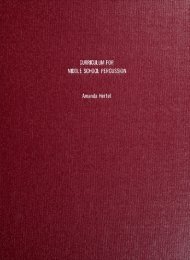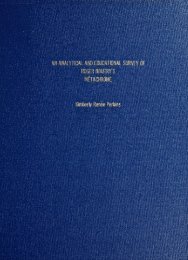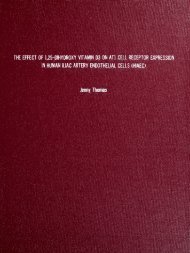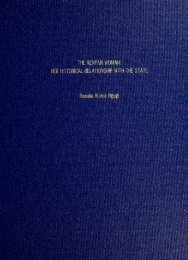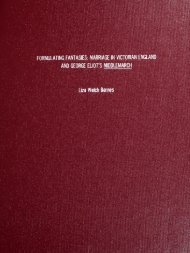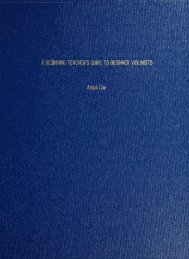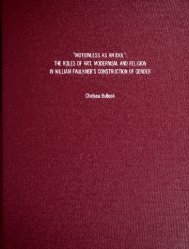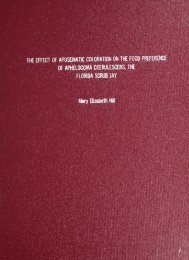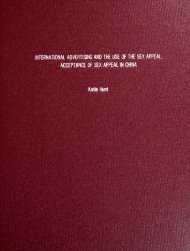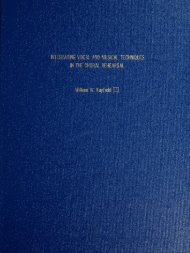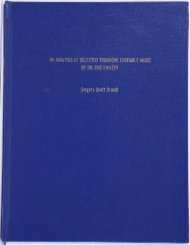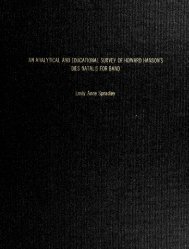Constructing the Christian: Agency and Emulation in Old English ...
Constructing the Christian: Agency and Emulation in Old English ...
Constructing the Christian: Agency and Emulation in Old English ...
- No tags were found...
Create successful ePaper yourself
Turn your PDF publications into a flip-book with our unique Google optimized e-Paper software.
Digitized by <strong>the</strong> Internet Archive<strong>in</strong> 2012 with fund<strong>in</strong>g fromLYRASIS Members <strong>and</strong> Sloan Foundationhttp://archive.org/details/construct<strong>in</strong>gchriOOross
$&-^
Ross 3accomplishments are even more important than those he actually achieves. The story wouldnot be <strong>the</strong> same at all if Byrhtnoth's loyal reta<strong>in</strong>ers had cont<strong>in</strong>ued fight<strong>in</strong>g because <strong>the</strong>ythought <strong>the</strong>y could w<strong>in</strong>, had no opportunity to escape, or for any reason o<strong>the</strong>r than out ofpersonal commitment to Byrhtnoth <strong>and</strong> <strong>the</strong> honor-bond <strong>in</strong>to which <strong>the</strong>y had entered when<strong>the</strong>y undertook his service. This <strong>in</strong>dicates that <strong>the</strong>ir firm <strong>in</strong>tent to w<strong>in</strong> <strong>the</strong> battle, which <strong>the</strong>ypursued as far as humanly possible, earned <strong>the</strong>m similar honor to that which <strong>the</strong>y would havega<strong>in</strong>ed had <strong>the</strong>y actually won <strong>the</strong> battle.Though <strong>the</strong>y die, <strong>the</strong>y are not totally defeatedbecause <strong>the</strong>y die bravely <strong>and</strong> on <strong>the</strong>ir own terms. This elevation of <strong>the</strong> idea to <strong>the</strong> level of <strong>the</strong>actual <strong>and</strong> <strong>the</strong> <strong>in</strong>tended act over <strong>the</strong> result of <strong>the</strong> attempted one becomes even moreimportant when discuss<strong>in</strong>g religious subjects.When God is <strong>the</strong> lord be<strong>in</strong>g served, spiritualwarfare, tak<strong>in</strong>g place <strong>in</strong> <strong>the</strong> m<strong>in</strong>d of <strong>the</strong> <strong>Christian</strong>, becomes an analogue for physical battle, <strong>and</strong>physical contention likewise takes on an added spiritual dimension. The ways Anglo-Saxon<strong>Christian</strong>s imag<strong>in</strong>ed <strong>the</strong>mselves <strong>in</strong> relation to God can be glimpsed <strong>in</strong> <strong>the</strong>ir poetic depictions ofthis spiritual <strong>and</strong> social bond.In Beowulf <strong>and</strong> <strong>the</strong> Critics, J.R.R. Tolkien locates a key feature of pre-<strong>Christian</strong> Germanicthought that, when transfused <strong>in</strong>to early <strong>English</strong> <strong>Christian</strong>ity, would solidify <strong>the</strong> l<strong>in</strong>k betweenhuman <strong>and</strong> deity even while elevat<strong>in</strong>g courageous human agency to a level comparable toGod's:The monsters were <strong>the</strong> foes of <strong>the</strong> Gods, <strong>and</strong> <strong>the</strong> monsters would w<strong>in</strong>; <strong>and</strong> <strong>in</strong> <strong>the</strong> heroicsiege <strong>and</strong> <strong>the</strong> last defeat alike men <strong>and</strong> Gods were <strong>in</strong> <strong>the</strong> same host. And though <strong>the</strong> oldGods departed men rema<strong>in</strong>ed, <strong>the</strong> heroes . . . fought on, or wove from splendid forms<strong>the</strong> fantastic banners of human courage, until defeat. For <strong>the</strong> monsters rema<strong>in</strong>ed -
Ross 4<strong>in</strong>deed <strong>the</strong>y do rema<strong>in</strong>; <strong>and</strong> a <strong>Christian</strong> was no less hemmed <strong>in</strong> by <strong>the</strong> world that is notman than <strong>the</strong> pagan. Yet <strong>the</strong> war had changed. For now <strong>the</strong>re is one Lord <strong>and</strong> Dryhten .. . . (66).The <strong>Christian</strong> hero's attitude toward defeat <strong>in</strong> essence is his victory.In physical battle with ahuman enemy, it is <strong>the</strong>refore possible to lose <strong>the</strong> fight <strong>and</strong> yet w<strong>in</strong> posthumous honor, but <strong>in</strong>spiritual combat this <strong>in</strong>ternal struggle to reta<strong>in</strong> moral courage when confronted with evil forcesbecomes <strong>the</strong> only fight that matters - a dist<strong>in</strong>ction which helps expla<strong>in</strong> how Juliana can be bothvictorious <strong>and</strong> dead at <strong>the</strong> end of her poem. Henry Mayr-Hart<strong>in</strong>g notes that, <strong>in</strong> "one of <strong>the</strong>subtlest of Professor Tolkien's po<strong>in</strong>ts," "<strong>the</strong> Beowulf poet, though removed from <strong>the</strong> directpressure of <strong>the</strong> old despair by his confidence <strong>in</strong> <strong>the</strong> <strong>Christian</strong> God, still feels it with a poetical<strong>in</strong>tensity" (236). Robert Boenig also notices <strong>the</strong> stunn<strong>in</strong>g force with which this feel<strong>in</strong>gcont<strong>in</strong>ued to impact Anglo-Saxon thought, f<strong>in</strong>d<strong>in</strong>g that "what <strong>the</strong> church's engagement with<strong>the</strong> paganism of <strong>the</strong> past gave to Anglo-Saxon spirituality was an outlook that was at hearteschatological <strong>and</strong> heroic" (30). He <strong>the</strong>refore deems a conflation of <strong>the</strong> nor<strong>the</strong>rn Germanicconcept of Ragnarok (<strong>in</strong> which <strong>the</strong> gods are defeated) <strong>and</strong> <strong>Christian</strong> Armageddon to be "amerger amenable to <strong>the</strong> converted pagan's religious outlook" (31). He f<strong>in</strong>ds that "<strong>in</strong> <strong>the</strong> oldgods' struggle aga<strong>in</strong>st <strong>the</strong> forces of evil, what was important was heroism <strong>in</strong> a los<strong>in</strong>g fight" (40).While it may seem strange that <strong>the</strong> Anglo-Saxons would have <strong>in</strong>corporated a mood of defeat<strong>in</strong>to <strong>the</strong> <strong>Christian</strong> narrative's positive assertion of God's eventual victory over all forces thatoppose him (<strong>and</strong> of God's rewards for those who have served him well) <strong>the</strong> grim undertoneadds a rich layer of emotional engagement to <strong>the</strong> narrative of human/God <strong>in</strong>teractions. Afterall, it takes a great deal more personal commitment to voluntarily die with a lord than to w<strong>in</strong>
with him; likewise a lord whose enemies are his people's enemies, who is will<strong>in</strong>g to die with histhanes while fight<strong>in</strong>g for his people's safety <strong>and</strong> prosperity is <strong>in</strong>f<strong>in</strong>itely more worth follow<strong>in</strong>gthan one who merely issues orders to subord<strong>in</strong>ates from a safe distance, without any risk ofdefeat.Guy Bourqu<strong>in</strong> exam<strong>in</strong>es this mutually dependent relationship between God <strong>and</strong> <strong>the</strong><strong>in</strong>dividual human protagonist <strong>in</strong> <strong>Old</strong> <strong>English</strong> heroic-religious poetry. He f<strong>in</strong>ds that <strong>the</strong>connection is rooted <strong>in</strong>a two-way (or circular) movement: on one h<strong>and</strong> God needs a human creature (haeled)to manifest his own essential truth (<strong>the</strong> selflessness of love); on <strong>the</strong> o<strong>the</strong>r h<strong>and</strong>, anyhuman be<strong>in</strong>g who s<strong>in</strong>cerely attempts to develop to <strong>the</strong> full mank<strong>in</strong>d's hidden {haeledlike)potentialities <strong>in</strong>evitably br<strong>in</strong>gs out <strong>and</strong> sh<strong>in</strong>es forth <strong>the</strong> div<strong>in</strong>e truth of which thosepotentialities are made. (9)Here, Bourqu<strong>in</strong> detects an important part of <strong>the</strong> believer-God relationship - God's reliance on<strong>in</strong>dividual humans - but Idisagree that manifest<strong>in</strong>g selfless love is <strong>the</strong> ultimate goal pursued by<strong>the</strong> God depicted <strong>in</strong> <strong>the</strong>se poems. While this may be a part of God's motivation (particularly <strong>in</strong>more New Testament-lean<strong>in</strong>g poems), it pales <strong>in</strong> comparison to his more concrete exercise of<strong>the</strong> duties befitt<strong>in</strong>g <strong>the</strong> most perfect lord: protect<strong>in</strong>g his people from enemies, acquir<strong>in</strong>g gloryfor himself <strong>and</strong> his thanes, <strong>and</strong> adm<strong>in</strong>istrat<strong>in</strong>g an orderly system of justice <strong>in</strong> which good serviceis rewarded <strong>and</strong> disloyalty - which is <strong>the</strong> def<strong>in</strong>ition of any wicked deed when God is <strong>the</strong> lord <strong>in</strong>question - is punished. If <strong>the</strong> "selflessness of love" that Bourqu<strong>in</strong> discusses encompassesmercy toward enemies, he is mistaken to cite it as God's overarch<strong>in</strong>g goal <strong>in</strong> all "<strong>the</strong> Biblical <strong>and</strong>o<strong>the</strong>r religious poems" (9). While God may show mercy toward some enemies (as he
Ross 6apparently does when he arranges for <strong>the</strong> Mermydonians to be converted to <strong>Christian</strong>ity by <strong>the</strong>heroic Andreas <strong>in</strong> <strong>the</strong> Vercelli Book poem of <strong>the</strong> same name, for example), this is onlyapplicable if those enemies cease to def<strong>in</strong>e <strong>the</strong>mselves as such <strong>and</strong> jo<strong>in</strong> his side - a humiliat<strong>in</strong>gadmission of defeat for <strong>the</strong>m <strong>and</strong> one that can only <strong>in</strong>crease God's <strong>in</strong>fluence <strong>and</strong> renown.In The Dream of <strong>the</strong> Rood, Beowulf, Judith, <strong>and</strong> Juliana, failure is always a possibleoutcome for both humans <strong>and</strong> God. The poems portray <strong>the</strong> heroes' <strong>and</strong> hero<strong>in</strong>es' combataga<strong>in</strong>st <strong>the</strong>ir morally decrepit enemies with a keen sense of dramatic urgency because God'somnipotence is, paradoxically, subject to <strong>the</strong>ir free will. While humans are never presented ashav<strong>in</strong>g <strong>the</strong> power to force God to someth<strong>in</strong>g he does not wish to do, <strong>the</strong>ir <strong>in</strong>ability orunwill<strong>in</strong>gness to participate <strong>in</strong> his plans would effectively thwart <strong>the</strong>m.The TextsWhile manuscript dat<strong>in</strong>g cannot def<strong>in</strong>itively establish <strong>the</strong> time of composition for eachpoem, <strong>the</strong> fact that <strong>the</strong> books were probably all transcribed dur<strong>in</strong>g <strong>the</strong> tenth <strong>and</strong> eleventhcenturies <strong>in</strong>dicates that <strong>the</strong>ir contents have one important th<strong>in</strong>g <strong>in</strong> common: The ideas <strong>the</strong>yexpress were all compell<strong>in</strong>g enough to capture audiences dur<strong>in</strong>g this time. Though <strong>the</strong> mereexistence of a manuscript cannot establish whe<strong>the</strong>r its contents enjoyed widespreadpopularity, it does confirm that someone was <strong>in</strong>terested enough <strong>in</strong> <strong>the</strong>m to commission <strong>the</strong>manuscript. The variations <strong>in</strong> <strong>the</strong> shad<strong>in</strong>g with which each poet colours <strong>the</strong> relationall<strong>and</strong>scape of devotion were, <strong>the</strong>refore, all imag<strong>in</strong>able to <strong>the</strong> tenth-to-eleventh-century <strong>English</strong>m<strong>in</strong>d. While Ido not suggest that any reader of one of <strong>the</strong>se texts would have automaticallyliked <strong>the</strong> o<strong>the</strong>rs, it is important to consider <strong>the</strong> scope of ideas that were th<strong>in</strong>kable at this time.
Ross 7The fact that poems that tip <strong>the</strong> scale <strong>in</strong> favour of God's overarch<strong>in</strong>g control of human affairs(such as Juliana) also use <strong>the</strong> rhetorical elements of more secular heroic verse (such as Beowulf)means that structure of dynamic shared agency on which such poems are built is also <strong>in</strong>herent<strong>in</strong> those <strong>in</strong> which its presence may be less obvious.The four poems each show a different variation on <strong>the</strong> human/God relationship that isessentially <strong>the</strong> same: In order to be able to carry out <strong>the</strong>ir own plans <strong>and</strong> <strong>the</strong>refore also fulfilGod's will, <strong>the</strong> heroes <strong>and</strong> hero<strong>in</strong>es must have some <strong>in</strong>tr<strong>in</strong>sic virtue of <strong>the</strong>ir own if <strong>the</strong>y are tobe up to <strong>the</strong>ir tasks. This virtue may be physical or mental/spiritual strength, but it is <strong>the</strong>prerequisite for anyone who wants to ga<strong>in</strong> God's favour. In o<strong>the</strong>r words, God can only endowhumans with supernormal abilities to slay monsters, defeat militarily superior enemies, orthrottle demons if <strong>the</strong>y <strong>the</strong>mselves <strong>in</strong>herently possess superb normal abilities. This pre-exist<strong>in</strong>gmerit that enables <strong>the</strong>m to w<strong>in</strong> God's favour is figured <strong>in</strong> different ways <strong>in</strong> each poem: In TheDream of <strong>the</strong> Rood, <strong>the</strong> balance between <strong>in</strong>ternal <strong>and</strong> external manifestations of virtue isevenly weighted, match<strong>in</strong>g that poem's conflation of Christ, <strong>the</strong> Rood, <strong>and</strong> <strong>the</strong> Dreamer as itencourages <strong>the</strong> reader to emulate this model of total unity with God's will; Beowulf's heroism isrooted primarily <strong>in</strong> his physical abilities; Judith has a much more spiritual locus of power(though her physical strength is still prom<strong>in</strong>ent); Juliana's strength is primarily spiritual. In all of<strong>the</strong>se poems, physical power <strong>and</strong> spiritual power are treated as nearly <strong>the</strong> same th<strong>in</strong>g, enabl<strong>in</strong>g<strong>the</strong> person who has one to access <strong>the</strong> advantages of <strong>the</strong> o<strong>the</strong>r. While I assert that <strong>the</strong> text ofThe Dream of <strong>the</strong> Rood as we have it <strong>in</strong> <strong>the</strong> Vercelli Book is considerably later than <strong>the</strong> orig<strong>in</strong>alpoem - which likely existed <strong>in</strong> an oral form before its <strong>in</strong>scription on <strong>the</strong> Ruthwell Cross (dur<strong>in</strong>g<strong>the</strong> first half of <strong>the</strong> eighth century (Dickens & Ross 8]), all three manuscripts are from a
Ross 8relatively short timespan. Each poem reveals a subtly different facet of <strong>the</strong> imag<strong>in</strong>ed role of <strong>the</strong>ideal believer, but <strong>the</strong> Germanic lord-thane relationship - with <strong>the</strong> mutual dependency itentails - is <strong>the</strong> common thread connect<strong>in</strong>g all five.The Vercelli Book <strong>and</strong> Analogues for The Dream of <strong>the</strong> Rood: There are three objects onor <strong>in</strong> which <strong>the</strong> text of The Dream of <strong>the</strong> Rood can be found:<strong>the</strong> Brussels Cross, <strong>the</strong> VercelliBook, <strong>and</strong> <strong>the</strong> Ruthwell Cross. Bruce Dickens <strong>and</strong> Alan S. C. Ross address <strong>the</strong>se analogues <strong>in</strong> <strong>the</strong><strong>in</strong>troduction of <strong>the</strong>ir edition of The Dream of <strong>the</strong> Rood. The Brussels Cross is a small woodenrelic (which, Dickens <strong>and</strong> Ross expla<strong>in</strong>, was probably once purported to conta<strong>in</strong> a fragment of<strong>the</strong> True Cross) with iconographic silverwork on its back (its front plat<strong>in</strong>g has not survived)around <strong>the</strong> edges of which two l<strong>in</strong>es "rem<strong>in</strong>iscent" of The Dream of <strong>the</strong> Rood are <strong>in</strong>scribed (14-15). The l<strong>in</strong>es <strong>in</strong> question - "Rod is m<strong>in</strong> nama; geo ic ricne cyn<strong>in</strong>g baer byfigynde, blodebestemed" [Rood is my name; Ionce bore <strong>the</strong> great k<strong>in</strong>g, trembl<strong>in</strong>g, covered with blood] 1 -closely resemble l<strong>in</strong>es 44 <strong>and</strong> 48 of <strong>the</strong> Vercelli text (Mitchell <strong>and</strong> Rob<strong>in</strong>son 257). Dickens <strong>and</strong>Ross note <strong>the</strong> difficulty <strong>in</strong> precisely dat<strong>in</strong>g <strong>the</strong> Brussels Cross, <strong>and</strong> <strong>in</strong> <strong>the</strong> absence of evidence to<strong>the</strong> contrary, conclude that "<strong>the</strong> l<strong>in</strong>guistic evidence renders a probable date <strong>in</strong> <strong>the</strong> late tenth oreleventh century. ." . . (15). They assert that, because "it seems to conta<strong>in</strong> no more than arem<strong>in</strong>iscence of <strong>the</strong> poem," <strong>the</strong>re is no way to accurately determ<strong>in</strong>e "<strong>the</strong> relation of <strong>the</strong><strong>in</strong>scription on <strong>the</strong> Brussels Cross to <strong>the</strong> o<strong>the</strong>r two versions" (18).This be<strong>in</strong>g <strong>the</strong> case, <strong>the</strong> textsof <strong>the</strong> Vercelli Book <strong>and</strong> <strong>the</strong> Ruthwell Cross provide more fruitful avenues of study.The VercelliBook conta<strong>in</strong>s <strong>the</strong> longest <strong>in</strong>carnation of <strong>the</strong> poem, is neatly transcribed, <strong>and</strong> isuncontroversially dated to sometime between 950-1000 (13).The Ruthwell Cross, likely <strong>the</strong>All quotations are from "The Dream of <strong>the</strong> Rood." A Guide to <strong>Old</strong> <strong>English</strong>. Eds. Bruce Mitchell <strong>and</strong> Fred C.Rob<strong>in</strong>son. Oxford: Blackwell, 2001. 256-263. Pr<strong>in</strong>t. Translations are my own.
Ross 9oldest of <strong>the</strong> three objects, is a carved stone monument that now resides <strong>in</strong> <strong>the</strong> church ofRuthwell <strong>in</strong> Dumfriesshire, Scotl<strong>and</strong>. Once <strong>the</strong> target of v<strong>and</strong>alism, <strong>the</strong> cross is damaged <strong>and</strong>some sections of <strong>the</strong> runic text are now miss<strong>in</strong>g. Dickens <strong>and</strong> Ross po<strong>in</strong>t out that "<strong>the</strong> text on<strong>the</strong> Ruthwell Cross is considerably shorter than <strong>the</strong> correspond<strong>in</strong>g passages <strong>in</strong> <strong>the</strong> Vercelli Book,<strong>and</strong> it seems possible that <strong>the</strong> latter may represent some k<strong>in</strong>d of expansion of <strong>the</strong> former" (17).This seems a plausible idea because <strong>the</strong> miss<strong>in</strong>g sections of <strong>the</strong> Ruthwell text are not largeenough to conta<strong>in</strong> all <strong>the</strong> additional material from <strong>the</strong> Vercelli text.Not<strong>in</strong>g this, Dickens <strong>and</strong>Ross acknowledge <strong>the</strong> possibility that "<strong>the</strong> Vercelli text goes back to an orig<strong>in</strong>al poem fromwhich extracts are carved on <strong>the</strong> Ruthwell Cross" (17). The Ruthwell Cross, <strong>the</strong>n, is of primaryimportance for determ<strong>in</strong><strong>in</strong>g when The Dream of <strong>the</strong> Rood was orig<strong>in</strong>ally composed, while <strong>the</strong>Vercelli Book offers <strong>the</strong> most comprehensive text.Possible dates for <strong>the</strong> Ruthwell Cross range from 670 to <strong>the</strong> 1100s, but Dickens <strong>and</strong> Rossf<strong>in</strong>d <strong>the</strong> later dates highly improbable, conclud<strong>in</strong>g that, based on <strong>the</strong> type of runes used, 750 is<strong>the</strong> latest plausible year for <strong>the</strong> Ruthwell Cross (6). In <strong>the</strong> absence of def<strong>in</strong>itive evidence, aplausible work<strong>in</strong>g hypo<strong>the</strong>sis for dat<strong>in</strong>g <strong>the</strong> analogues for The Dream of <strong>the</strong> Rood places <strong>the</strong>Ruthwell Cross at <strong>the</strong> beg<strong>in</strong>n<strong>in</strong>g of <strong>the</strong> cont<strong>in</strong>uum (ei<strong>the</strong>r as <strong>the</strong> orig<strong>in</strong>al presentation of <strong>the</strong>poem or as <strong>the</strong> first written version of an already exist<strong>in</strong>g poem, which could have been<strong>in</strong>scribed as early as 670), followed by <strong>the</strong> Vercelli Book (which is a later elaboration upon <strong>the</strong>orig<strong>in</strong>al, older poem). John C. Pope, <strong>in</strong> his edition, agrees; he asserts "that <strong>the</strong> poem was firstcomposed before A.D. 750 (even, as some th<strong>in</strong>k, before 700) is attested by <strong>the</strong> presence of <strong>the</strong>central part of <strong>the</strong> rood's speech ... on <strong>the</strong> monumental cross at Ruthwell ." . . . (60). He notesof <strong>the</strong> l<strong>in</strong>es that appear on it that "<strong>the</strong> greater regularity of form suggests that <strong>the</strong> <strong>in</strong>scription
may at this po<strong>in</strong>t be giv<strong>in</strong>g us an earlier read<strong>in</strong>g ra<strong>the</strong>r than an abridgement" (66), lend<strong>in</strong>gfur<strong>the</strong>r credence to <strong>the</strong> idea that <strong>the</strong> poem itself considerably predates <strong>the</strong> version of it thatappears <strong>in</strong> <strong>the</strong> Vercelli Book.As <strong>the</strong> conversion of Engl<strong>and</strong> to <strong>Christian</strong>ity began withAugust<strong>in</strong>e's arrival <strong>in</strong> 597 (Fisher 69), it seems very possible that The Dream of <strong>the</strong> Rood wasorig<strong>in</strong>ally composed dur<strong>in</strong>g this period <strong>and</strong> transmitted orally before <strong>the</strong> Ruthwell Cross wascarved.Cotton Vitellius A.xv:Beowulf <strong>and</strong> Judith are both preserved <strong>in</strong> this manuscript, nowhoused <strong>in</strong> <strong>the</strong> British Museum. The book as it now st<strong>and</strong>s is comprised of two manuscripts,which were likely comb<strong>in</strong>ed when <strong>the</strong>y entered Sir Robert Cotton's collection <strong>and</strong> before <strong>the</strong>great fire his library suffered <strong>in</strong> 1731 (Dobbie ix). The earlier manuscript, which conta<strong>in</strong>sBeowulf <strong>and</strong> Judith was copied by two scribes; <strong>the</strong> first h<strong>and</strong> stops at l<strong>in</strong>e 1939 of Beowulf, <strong>and</strong><strong>the</strong> second cont<strong>in</strong>ues from <strong>the</strong>re to copy <strong>the</strong> entirety of Judith. Elliott Van Kirk Dobbie notesthat "for <strong>the</strong> place of orig<strong>in</strong> of <strong>the</strong> manuscript <strong>and</strong> its early history <strong>the</strong>re is no evidencewhatever" (xix). Col<strong>in</strong> Chase, editor of The Dat<strong>in</strong>g of Beowulf, notes <strong>the</strong> uncerta<strong>in</strong>ty thatsurrounds any attempt to p<strong>in</strong> down precise dates. He observes that "<strong>in</strong> <strong>the</strong> long history ofscholarly <strong>in</strong>terest <strong>in</strong> this subject few chronological facts have been so clear <strong>and</strong> conv<strong>in</strong>c<strong>in</strong>g as tocomm<strong>and</strong> immediate <strong>and</strong> last<strong>in</strong>g agreement," referenc<strong>in</strong>g <strong>the</strong> "general scholarly consensusthat <strong>the</strong> manuscript dates from near <strong>the</strong> year 1000" as one of <strong>the</strong>m (8). Also <strong>in</strong> The Dat<strong>in</strong>g ofBeowulf, Kev<strong>in</strong> S. Kiernan argues that <strong>the</strong> poem was composed at about <strong>the</strong> same time as <strong>the</strong>manuscript.In build<strong>in</strong>g his argument, Kiernan exam<strong>in</strong>es this date as provided by "Neil R. Ker,<strong>the</strong> acknowledged authority on Anglo-Saxon palaeography, [who] dates <strong>the</strong> Beowulf manuscriptby its script alone at <strong>the</strong> beg<strong>in</strong>n<strong>in</strong>g of <strong>the</strong> eleventh century" <strong>in</strong> his Catalogue of Manuscripts
Ross 11Conta<strong>in</strong><strong>in</strong>g Anglo-Saxon (Oxford 1957), with which dat<strong>in</strong>g Kiernan concurs (10). He highlightsKer's emphasis on <strong>the</strong> approximate nature of his dat<strong>in</strong>g, not<strong>in</strong>g that it is "best <strong>in</strong>terpreted as(roughly) 975-1025 (10). Kiernan proposes a fur<strong>the</strong>r narrow<strong>in</strong>g of this w<strong>in</strong>dow based on hisassertion that "s<strong>in</strong>ce <strong>the</strong> open<strong>in</strong>g l<strong>in</strong>es of Beowulf unabashedly celebrate <strong>the</strong> found<strong>in</strong>g of <strong>the</strong>Danish Scyld<strong>in</strong>g l<strong>in</strong>e, it is difficult to imag<strong>in</strong>e Anglo-Saxon scribes placidly copy<strong>in</strong>g <strong>the</strong> Beowulfmanuscript dur<strong>in</strong>g /E<strong>the</strong>lred's reign," <strong>and</strong> that "<strong>the</strong> most probable time of <strong>the</strong> manuscript, <strong>the</strong>n,is sometime after 1016, when <strong>the</strong> genealogical panegyric was a compliment, ra<strong>the</strong>r than an<strong>in</strong>sult, to <strong>the</strong> reign<strong>in</strong>g k<strong>in</strong>g," Knut <strong>the</strong> Great, who ruled from 1016 to 1035 (10). While <strong>the</strong> exacthistory of Beowulf s composition may never be known, <strong>the</strong> fact that someone went to <strong>the</strong>trouble of commission<strong>in</strong>g a manuscript conta<strong>in</strong><strong>in</strong>g <strong>the</strong> poem as we have it dur<strong>in</strong>g <strong>the</strong> earlyeleventh century <strong>in</strong>dicates that someone at that time wanted to read it, whe<strong>the</strong>r forenterta<strong>in</strong>ment, edification, or both.The Exeter Book :The manuscript conta<strong>in</strong><strong>in</strong>g Juliana resides at Exeter Ca<strong>the</strong>dral, whereitis believed to have arrived as donation from <strong>the</strong> ca<strong>the</strong>dral's first bishop, Leofric, who madenumerous donations to its library <strong>and</strong> who died <strong>in</strong> 1072 (Krapp & Dobbie ix). Krapp <strong>and</strong> Dobbieare confident that "<strong>the</strong> date of <strong>the</strong> h<strong>and</strong>writ<strong>in</strong>g of <strong>the</strong> Exeter Book is evidently to be placed <strong>in</strong><strong>the</strong> second half of <strong>the</strong> tenth century" (xiii). Fur<strong>the</strong>rmore, <strong>the</strong>y note that "Cynewulf's authorshipof <strong>the</strong> poem has been universally accepted on <strong>the</strong> evidence of <strong>the</strong> runic signature <strong>in</strong> II. 703-709"(xxxvi). His source was likely <strong>the</strong> sa<strong>in</strong>t's life "Acta auctore anonymo ex xi veteribus MSS." whichis<strong>in</strong> <strong>the</strong> Boll<strong>and</strong>ist Acta sanctorum (Krapp <strong>and</strong> Dobbie xxxvi).
The Dream of <strong>the</strong> RoodPerhaps <strong>the</strong> clearest example of poetic fusion of <strong>Christian</strong> <strong>and</strong> pre-<strong>Christian</strong> worldviewsis The Dream of <strong>the</strong> Rood. Partak<strong>in</strong>g equally of secular <strong>and</strong> spiritual modes of heroism, <strong>the</strong>anthropomorphized Rood has full <strong>and</strong> immediate access to Christ, <strong>and</strong> yet it comes to <strong>the</strong>encounter as an ord<strong>in</strong>ary tree who ga<strong>in</strong>s agency only by means of its union with Christ.Just as<strong>the</strong>re is no such th<strong>in</strong>g as a lord who has no thanes, <strong>the</strong> experience of ga<strong>in</strong><strong>in</strong>g Christ as a lord canmoke a thane out of any entity that desires to serve bravely.In determ<strong>in</strong><strong>in</strong>g how best toportray <strong>the</strong> crucifixion story, <strong>the</strong> conversion-era poet crafts an excit<strong>in</strong>g adventure-storybecause <strong>the</strong> image of Jesus as a meek <strong>and</strong> patient sufferer accept<strong>in</strong>g a passive role <strong>in</strong> hisexecution would not have appealed to <strong>the</strong> <strong>English</strong> people of this time. The Anglo-Saxons held aGermanic worldview <strong>in</strong> which bravery <strong>and</strong> strength <strong>in</strong> battle were highly valued <strong>and</strong> meeknesswhen confronted by enemies would have been seen as weakness. Accord<strong>in</strong>gly, <strong>the</strong> poet of TheDream of <strong>the</strong> Rood chose to de-emphasize <strong>the</strong> aspects of <strong>the</strong> crucifixion story least likely tocommend it to his audience <strong>in</strong> favor of those <strong>the</strong>y would be more likely to appreciate. Heemphasizes Jesus' courage <strong>and</strong> strength, giv<strong>in</strong>g him agency <strong>in</strong> his heroic battle with death whilecast<strong>in</strong>g him <strong>in</strong> <strong>the</strong> mold of a Germanic warrior-k<strong>in</strong>g.The speaker of <strong>the</strong> poem recounts a vision<strong>in</strong> which <strong>the</strong> Rood tells him its first-person account of <strong>the</strong> crucifixion, itself tak<strong>in</strong>g on <strong>the</strong> role ofJesus' loyal thane <strong>in</strong> an example of <strong>the</strong> comitatus upheld <strong>and</strong> <strong>in</strong> which <strong>the</strong> dreamer (<strong>and</strong>, byextension, <strong>the</strong> audience) is <strong>in</strong>vited to participate. Jesus <strong>and</strong> <strong>the</strong> Rood share a powerfully<strong>in</strong>timate lord/thane bond that serves as a prime exemplum of <strong>the</strong> ideal relationship between an<strong>in</strong>dividual <strong>Christian</strong> <strong>and</strong> his God. The controll<strong>in</strong>g metaphor of Jesus <strong>and</strong> <strong>the</strong> Rood as Germanic
Ross 13lord <strong>and</strong> thane is best seen <strong>in</strong> l<strong>in</strong>es 39-43, which, <strong>in</strong> a "partially preserved <strong>and</strong> somewhatabridged" form, also appear on <strong>the</strong> Ruthwell Cross (Pope 66):Ongyrede h<strong>in</strong>e pa geong haeleci- baet waes God aelmihtig!Strang <strong>and</strong> stidmod;gestah he on gealgan heanne,modig on manigra gesyhde,pa he wolde mancyn lysan.Bifode ic pa me se beorn ymbclypte;ne dorste ic hwaecVe bugan to eorflan,feallan to foldan sceatum,ac ic sceolde faeste st<strong>and</strong>an.[The young hero stripped himself - that was God almighty -strong <strong>and</strong> resolute;he began to climb,brave <strong>in</strong> <strong>the</strong> sight of many,when he wished to redeem mank<strong>in</strong>d.I trembled when <strong>the</strong> warrior embraced me; but I dared not bow down to earth,nor fall to <strong>the</strong> surface of <strong>the</strong> fields, but Imust st<strong>and</strong> fast.]The Germanic concept of a hero was that of a good warrior; a good thane was one who servedhis lord unswerv<strong>in</strong>gly; a good lord protected his thanes <strong>and</strong> rewarded <strong>the</strong>m for faithful service.The poet casts Jesus as <strong>the</strong> best <strong>and</strong> bravest of warrior-heroes, defeat<strong>in</strong>g <strong>the</strong> ultimate foe,Death itself. Though it "bifode" [trembled] before <strong>the</strong> crucifixion (42), <strong>the</strong> Rood faithfullyupholds its lord <strong>in</strong> battle so that <strong>the</strong>y are <strong>in</strong>jured toge<strong>the</strong>r, leav<strong>in</strong>g it metaphorically "midstraelum forwundod" [sorely wounded with arrows] represent<strong>in</strong>g <strong>the</strong> nails (62), <strong>in</strong> a sectionwhich also appears on <strong>the</strong> Ruthwell Cross. The poet who elaborates upon <strong>the</strong> Ruthwell versionof <strong>the</strong> poem <strong>in</strong> <strong>the</strong> Vercelli Book picks up <strong>the</strong> Germanic threads <strong>and</strong> carries on <strong>in</strong> a similar style:When <strong>the</strong> faithful Rood is buried <strong>in</strong> a pit, Jesus' agents come to its aid (illustrat<strong>in</strong>g that it isunder his protection) <strong>and</strong> give it adornments of "golde <strong>and</strong> seolfre" [gold <strong>and</strong> silver] (77), a
Ross 14reward noticeably similar to <strong>the</strong> Anglo-Saxon custom of r<strong>in</strong>g-giv<strong>in</strong>g (as exemplified <strong>in</strong> suchworks as Beowulf).Beg<strong>in</strong>n<strong>in</strong>g <strong>in</strong> l<strong>in</strong>e 95, <strong>the</strong> Rood exhorts <strong>the</strong> dreamer, call<strong>in</strong>g him "haele
Ross 15Not only does <strong>the</strong> poem depict Christ as a war leader who succeeds <strong>in</strong> his battle withdeath because of <strong>the</strong> brave support of <strong>the</strong> Rood, its encouragement that <strong>the</strong> reader emulate<strong>the</strong> extremely <strong>in</strong>timate relationship <strong>the</strong> Rood <strong>and</strong> Christ enjoy goes a step beyond <strong>the</strong> modelsoffered <strong>in</strong> <strong>the</strong> o<strong>the</strong>r poems. The Dreamer (an everyman figure with whom <strong>the</strong> reader canidentify), <strong>the</strong> Rood (an <strong>in</strong>animate object mystically endowed with <strong>the</strong> agency to decide itsloyalties as soon as it becomes associated with Christ), <strong>and</strong> Christ himself are each described as<strong>the</strong> sort of hgelefj who is able to <strong>in</strong>dividually choose to act <strong>in</strong> concert. Christ chooses toembrace death on <strong>the</strong> Rood, <strong>the</strong> Rood resolves to support its Lord at whatever cost, <strong>the</strong>Dreamer decides to emulate <strong>the</strong> Rood <strong>and</strong> thus share its role of uphold<strong>in</strong>g Christ, <strong>and</strong> <strong>the</strong>reader is exhorted to do likewise.In this system, anyone who reads or hears <strong>the</strong> poem is ableto imag<strong>in</strong>atively merge his or her own identity - via that of <strong>the</strong> <strong>in</strong>termediary Dreamer <strong>and</strong> Rood-with Christ himself.BeowulfBy determ<strong>in</strong><strong>in</strong>g <strong>the</strong> manner <strong>in</strong> which <strong>the</strong> Beowulf poet h<strong>and</strong>les his <strong>Christian</strong> <strong>and</strong> pre-<strong>Christian</strong> secular heroic material <strong>in</strong> this, <strong>the</strong> most physically <strong>and</strong> secularly oriented of <strong>the</strong> textsunder present consideration, we can locate it with<strong>in</strong> <strong>the</strong> spectrum of ideas that were coexist<strong>in</strong>g<strong>in</strong> Engl<strong>and</strong> at this time. As Klaeber po<strong>in</strong>ts out, "it is not far removed <strong>in</strong> time from <strong>the</strong>three o<strong>the</strong>r great collections conta<strong>in</strong><strong>in</strong>g <strong>Old</strong> <strong>English</strong> poems, viz. <strong>the</strong> Exeter Book, <strong>the</strong> VercelliCodex, <strong>and</strong> <strong>the</strong> so-called Caedmon Manuscript" (xcvi). That Beowulf was certa<strong>in</strong>ly be<strong>in</strong>g read(whatever its date of composition) <strong>in</strong> a time not distant from <strong>the</strong> o<strong>the</strong>r more religious, more<strong>in</strong>ternally active poems demonstrates that tales at all po<strong>in</strong>ts on <strong>the</strong> cont<strong>in</strong>uum were able to
Ross 17shared situation is perhaps more clear <strong>in</strong> this poem than <strong>in</strong> <strong>the</strong> o<strong>the</strong>rs, but it should beunsurpris<strong>in</strong>g; <strong>the</strong> important th<strong>in</strong>g is that both <strong>the</strong> humans <strong>and</strong> God commit fully to <strong>the</strong>ir mutualcourse of action.Throughout Beowulf, <strong>the</strong> hero's agency is always firmly <strong>in</strong> his own h<strong>and</strong>s. God's abilityto carry out his plans is also <strong>in</strong> Beowulf's h<strong>and</strong>s, for <strong>in</strong> this primarily secular poem - more clearlybut not necessarily more strongly than <strong>in</strong> <strong>the</strong> more didactic religious poems - God must f<strong>in</strong>d awarrior who is up to <strong>the</strong> task <strong>in</strong> order for his goals to be accomplished. Grendel is a "foe ofmank<strong>in</strong>d" (Liuzza 165), yet also an enemy who "Godes yrre baer" (Klaeber 711) ["bore God'sire"].As long as Grendel is alive, God (not only <strong>the</strong> Danes) has a problem. The God presented<strong>in</strong> this poem is dist<strong>in</strong>ctly not omnipotent; because nei<strong>the</strong>r Hrothgar nor any of his thanes isstrong enough to defeat Grendel, for twelve years God must suffer <strong>the</strong> cont<strong>in</strong>ued ascendancyof his enemy - a dishonourable maraud<strong>in</strong>g monster. This is an embarrass<strong>in</strong>g predicament forany lord.Hrothgar seems both ashamed for Danish <strong>in</strong>competence <strong>and</strong> hopeful that Beowulfwill succeed where <strong>the</strong>y have failed when he saysSorh is me to secganneon sefan m<strong>in</strong>umgumena aengum,hwaet me Grendel hafaOhyncio on Heorotemid his hetebancum,faemida gefremed;is m<strong>in</strong> fletwerod,wigheap gewanod;hie wyrd forsweopon Grendles gryre.God eape maegpone dolsceadan daeda getwaefan! (Klaeber 473-479)[It is a sorrow to my very soul
Ross 18to say to any man what Grendel has done to me—humiliated Heorot with his hateful thoughts,his sudden attacks. My hall-troop,my warriors, are decimated; wyrd has swept <strong>the</strong>m away<strong>in</strong>to Grendel's terror.God might easilyput an end to <strong>the</strong> deeds of this mad enemy! (Liuzza 473-479)]A couple of major po<strong>in</strong>ts are worth not<strong>in</strong>g here.Firstly, Hrothgar - of whom we are told "bastwaes an cyn<strong>in</strong>g / aeghwaes orleahtre, op past h<strong>in</strong>e yldo benam / maegenes wynnum, se beoft manegum scod" (Klaeber 1885-1887) ["that k<strong>in</strong>g was peerless, / blameless <strong>in</strong> everyth<strong>in</strong>g,until old age took from him / --it has <strong>in</strong>jured so many— <strong>the</strong> joy of his strength" (Liuzza 1885-1887)] - believes it to be a poor reflection on <strong>the</strong> Danes that none of <strong>the</strong>m has been able tostop Grendel even though God could have made this outcome happen at any time. This begs<strong>the</strong> question: so, why has God not done it already? Presumably, Hrothgar is operat<strong>in</strong>g with an<strong>in</strong>complete underst<strong>and</strong><strong>in</strong>g of his deity, whom he can only perceive through a glass darklybecause he lives <strong>in</strong> pre-<strong>Christian</strong> times <strong>and</strong> views God as a Germanic deity, but, even so, herealizes that his own goal (Grendel's defeat) can only be reached if God also makes it his goal.Secondly, Hrothgar sees wyrd as a force that has facilitated (or at least decl<strong>in</strong>ed to prevent)Grendel's victories.God <strong>and</strong> wyrd, both entities described as hav<strong>in</strong>g determ<strong>in</strong><strong>in</strong>g power overmen's lives <strong>and</strong> deaths, often appear to be treated as somewhat synonymous, but this usagecasts <strong>the</strong>m <strong>in</strong> clear opposition. In spite of some appearances to <strong>the</strong> contrary, God <strong>and</strong> wyrd arevery different, <strong>and</strong> fulfil specific roles <strong>in</strong> Anglo-Saxon poetry. Both make determ<strong>in</strong>ations abouthumans, but <strong>the</strong>ir criteria for mak<strong>in</strong>g <strong>the</strong>ir judgements is markedly dissimilar. Mary C. Wilson
Ross 19Tietjen's dist<strong>in</strong>ction is useful <strong>in</strong> evaluat<strong>in</strong>g Hrothgar's statement. She characterizes wyrd as "abl<strong>in</strong>d <strong>and</strong> whimsical force whose deal<strong>in</strong>gs with men are unrelated to <strong>the</strong>ir merit" <strong>and</strong> contraststhis with God, whom she sees through <strong>the</strong> narrator's eyes as a "benevolent <strong>Christian</strong> deity whoaffords grace <strong>and</strong> guidance to <strong>the</strong> worthy" (161). In this system, God's power has one firmlimit:he cannot cast positive judgements (<strong>and</strong> <strong>the</strong>ir attendant bless<strong>in</strong>gs) on <strong>in</strong>dividuals who areunworthy. Wyrd knows no such limitation; it may render positive or negative doom on anyoneirrespective of his or her personal strength. Why <strong>the</strong>n does God not enable <strong>the</strong> Danishdefenders of Heorot to prevail aga<strong>in</strong>st Grendel, <strong>the</strong>ir common enemy? The simple answer isthat none of <strong>the</strong>m was strong enough to do it, despite <strong>the</strong>ir best <strong>in</strong>tentions. God is eventuallyable to procure Beowulf - a man of prodigious physical strength <strong>and</strong> determ<strong>in</strong>ation - toaccomplish <strong>the</strong> task, but <strong>the</strong> Danes' shortcom<strong>in</strong>gs were a significant impediment to God thatactually delayed <strong>the</strong> execution of his will.This poem - told <strong>in</strong> a primarily secular ra<strong>the</strong>r than religious mode - tends to measurestrength by physical, martial means, whereas o<strong>the</strong>r, more primarily religious poems conflatemental/spiritual <strong>and</strong> physical strength to a greater degree or shift <strong>the</strong> contest entirely <strong>in</strong>to <strong>the</strong>spiritual realm.Perhaps <strong>in</strong> <strong>the</strong> world of Judith or Juliana Hrothgar's pious wisdom would besufficient to enable him to secure God's endowment of supernatural prowess that <strong>the</strong> hero<strong>in</strong>esof those tales - like Beowulf - enjoy. Yet, Irv<strong>in</strong>g identifies <strong>the</strong> o<strong>the</strong>rwise blameless Hrothgar'sfault: he is a "passive person, one who depends on God to rescue him <strong>and</strong> who even grumblesat one po<strong>in</strong>t that God could easily have done so earlier if he had had a m<strong>in</strong>d to" (14). Irv<strong>in</strong>ghighlights <strong>the</strong> fact that "this k<strong>in</strong>d of passivity . . . registers as negative on <strong>the</strong> assess<strong>in</strong>g scale of<strong>the</strong> traditional heroic poets" (15). In this sense, he is very different from Judith, though
somewhat similar to Juliana. Hrothgar commits no discernable moral s<strong>in</strong>, <strong>and</strong> he doeseveryth<strong>in</strong>g he can to fulfil his obligations to his people as <strong>the</strong>ir lord. What makes him a goodk<strong>in</strong>g is that he does his duty to <strong>the</strong> best of his ability at all times; no more than this canreasonably be required of anybody. However, <strong>the</strong> best of Hrothgar's ability is considerably lessthan <strong>the</strong> best of Beowulf's ability (at least when monster-slay<strong>in</strong>g is <strong>the</strong> matter at h<strong>and</strong>) - this iswhat makes Beowulf, not Hrothgar, <strong>the</strong> hero of <strong>the</strong> poem <strong>and</strong> <strong>the</strong> agent by whom God is ableto remove Grendel. Perhaps <strong>the</strong> old, passive Hrothgar is lack<strong>in</strong>g <strong>in</strong> <strong>the</strong> mental vigour that <strong>the</strong>young, active Beowulf possesses <strong>in</strong> abundance. If this is <strong>the</strong> case, it appears that God requirespotential heroes to have mental strength <strong>and</strong> <strong>the</strong> volition to exercise it <strong>in</strong> <strong>the</strong> fur<strong>the</strong>rance ofplans that God shares before he is able to confer on <strong>the</strong>m <strong>the</strong> ability (physical or spiritual) tosucceed.In order to determ<strong>in</strong>e <strong>the</strong> nature of this causal relationship, a closer look at <strong>the</strong> threeagents impact<strong>in</strong>g <strong>the</strong> hero's life - God, wyrd, <strong>and</strong> <strong>the</strong> hero himself- is <strong>in</strong> order. That a heromust deserve God's favour is nowhere so clear as dur<strong>in</strong>g Beowulf's fight with Grendel's mo<strong>the</strong>r:Haefde 5a forsidodsunu Ecgbeowesunder gynne grund,Geata cempa,nemne him headobyrnehelpe gefremede,herenet hearde, -ond halig Godgeweold wigsigor;witig Drihten,rodera Raedendhit on ryht gescedyaelice, sybdan he eft astod. (Klaeber 1550-1556)[There <strong>the</strong> son of Ecg<strong>the</strong>ow would have ended his life
under <strong>the</strong> wide ground, <strong>the</strong> Geatish champion,had not his armored shirt offered him help,<strong>the</strong> hard battle-net, <strong>and</strong> holy Godbrought about war-victory— <strong>the</strong> wise Lord,Ruler of <strong>the</strong> heavens, decided it rightly,easily, once he stood up aga<strong>in</strong>. (Liuzza 1550-1556)]The narrator wants us to know that Beowulf is able to w<strong>in</strong> because God decided to aid him, butGod only made this choice "sybdan" Beowulf (who could not know whe<strong>the</strong>r or not God wouldprovide help) decided to get up <strong>and</strong> bravely cont<strong>in</strong>ue fight<strong>in</strong>g.(The fact that he was wellprepared<strong>and</strong> brought good armor helps too.) Beowulf's take on this idea fur<strong>the</strong>r emphasizes<strong>the</strong> hero's role <strong>in</strong> determ<strong>in</strong><strong>in</strong>g his own success or failure:Wyrd oft neredunfaegne eorl, bonne his ellen deah! (Klaber 572-573)[Wyrd often sparesan undoomed man, when his courage endures! (Liuzza 572-573)]The narrator provides ano<strong>the</strong>r version of this sentiment when relat<strong>in</strong>g how <strong>the</strong> thief who stole<strong>the</strong> cup from <strong>the</strong> dragon's hoard managed to survive <strong>the</strong> escapade:Swa maeg unfaegeeacfe gediganwean ond wraecsiSse
Ross 22grace <strong>and</strong> protection! (Liuzza 2291-2293)]The implication here is that <strong>the</strong> "unfaege" human who is unafflicted by a f<strong>in</strong>al judgment fromwyrd might (if his spiritual strength is sufficient) w<strong>in</strong> <strong>the</strong> positive judgment from God that isnecessary if he is to be successful. However, it is equally possible that someone with whomwyrd is unconcerned may fail to merit God's protection <strong>and</strong> thus be defeated.Also implicit <strong>in</strong><strong>the</strong>se l<strong>in</strong>es is <strong>the</strong> limitation that God can only protect people for whom wyrd has not decreedan imm<strong>in</strong>ent demise, yet <strong>the</strong> dist<strong>in</strong>ction between God <strong>and</strong> wyrd breaks down as <strong>the</strong>ir rolesoverlap. Fur<strong>the</strong>rmore, <strong>the</strong> narrator affords greater importance to God's <strong>in</strong>volvement thanBeowulf does, but Beowulf's firm will to do that which God happens to also want is sufficient toenable him to do it, <strong>in</strong> this case. The narrator's description of Beowulf's anti-Grendel mission isambiguous about whose idea it is. He says thatHaefde Kyn<strong>in</strong>gwuldorGrendle togeanes,swa guman gefrungon,seleweard aseted;sundornytte beheoldymb aldor Dena, eotonweard' abead (Klaeber 665-668).[The glorious k<strong>in</strong>ghad set aga<strong>in</strong>st Grendel a hall-guardian-as men had heard said— who did special servicefor <strong>the</strong> k<strong>in</strong>g of <strong>the</strong> Danes, kept a giant-watch. (Liuzza 665-668)]Who is this "Kyn<strong>in</strong>gwuldor"? The word could easily apply to Hrothgar, who did <strong>in</strong>deed placeBeowulf <strong>in</strong> charge of defend<strong>in</strong>g his hall, but it could also refer to God. If so, this <strong>in</strong>dicates thateven though Beowulf meant "baet ic mote ana .../... Heorot faelsian" (Klaeber 431-432)
["that I might alone . . . cleanse Heorot" (Liuzza 431-432)] <strong>in</strong> order to w<strong>in</strong> glory for himself <strong>and</strong><strong>the</strong> Geats, his own personal course of action co<strong>in</strong>cides with God's desire to put an end toGrendel, <strong>the</strong> common enemy who "Godes yrre baer" (Klaeber 711) ["bore God's ire"]. Themorn<strong>in</strong>g after <strong>the</strong> fight, <strong>the</strong> narrator reveals that Grendel was "faege" (Klaeber 846); <strong>in</strong> thiscase, all <strong>the</strong> necessary conditions l<strong>in</strong>e up for Beowulf to have victory <strong>and</strong> for Grendel to bedefeated. Note that this knowledge of wyrd's verdict is not available to <strong>the</strong> characters with<strong>in</strong><strong>the</strong> poem. It is <strong>the</strong> narrator who tells us thatNe waes baet wyrd pa gen,paet he ma mostemanna cynnesclicgean ofer pa niht. (Klaeber 734-736)[But it was not his fateto taste any more of <strong>the</strong> race of mank<strong>in</strong>dafter that night. (Liuzza 734-735)]God's human agents cannot know whe<strong>the</strong>r or not <strong>the</strong>y are doomed before undertak<strong>in</strong>g anyparticular fight. The fact that Grendel was doomed on <strong>the</strong> occasion when he came to Heorotafter Beowulf had arrived <strong>and</strong> been stationed <strong>in</strong> <strong>the</strong> hall by <strong>the</strong> "Kyn<strong>in</strong>gwuldor" suggests that<strong>the</strong>ir actions aga<strong>in</strong>st him caused Grendel to become doomed.Grendel's downfall is <strong>the</strong>refore supported by a three-way agency tripod <strong>in</strong> which God,Beowulf, <strong>and</strong> wyrd all exercise <strong>the</strong>ir <strong>in</strong>dependent decision-mak<strong>in</strong>g power <strong>in</strong> a manner thatmakes each <strong>in</strong>extricably dependent on <strong>the</strong> o<strong>the</strong>r two. Beowulf must decide to fight Grendelunfl<strong>in</strong>ch<strong>in</strong>gly if God is to grant him <strong>the</strong> ability to w<strong>in</strong>; God must decide to destroy Grendel if any
Ross 24undoomed hero attempt<strong>in</strong>g to do so is to be successful; wyrd must allot Beowulf more life onthis earth if he is to be able to w<strong>in</strong> <strong>the</strong> fight he undertakes aga<strong>in</strong>st God's enemy.Beowulf's fight with Grendel's mo<strong>the</strong>r is <strong>the</strong>matically similar <strong>and</strong> her defeat broughtabout by <strong>the</strong> same triad of collaborat<strong>in</strong>g forces that ensured <strong>the</strong> death of her son.The fightbetween Beowulf <strong>and</strong> <strong>the</strong> dragon is significantly different; unlike Grendel <strong>and</strong> his mo<strong>the</strong>r, <strong>the</strong>dragon is never described as an enemy of God. Beowulf's choice to engage it <strong>in</strong> battles<strong>in</strong>gleh<strong>and</strong>edly is open to both positive <strong>and</strong> negative <strong>in</strong>terpretations, depend<strong>in</strong>g on one's viewof whe<strong>the</strong>r Beowulf's desire for personal glory is excessive or not.The dragon poses a realthreat to <strong>the</strong> Geats, so Beowulf's attempt to protect his people from it fits <strong>in</strong>to <strong>the</strong> role of agood secular lord. However, <strong>the</strong> narrator tells us that, on this occasion, he was doomed "swahim wyrd ne gescraf / hred aet hilde" (Klaeber 2574-2575) ["<strong>and</strong> wyrd did not / grant victory <strong>in</strong>battle" (Liuzza 2574-2575)]. Though <strong>the</strong> dragon dies, Beowulf is only able to kill it withconsiderable help from Wiglaf, <strong>and</strong> Beowulf's own death places his now-lordless people <strong>in</strong> avulnerable position. Just as <strong>the</strong> comb<strong>in</strong>ed support of God, wyrd, <strong>and</strong> <strong>the</strong> hero's own will, arenecessary for <strong>the</strong> full realization of <strong>the</strong> hero's will, <strong>the</strong> absence of this collaboration ensuresthat <strong>the</strong> <strong>in</strong>dividual hero's success can be <strong>in</strong>complete at best.JudithAs <strong>in</strong> Beowulf, <strong>the</strong> model <strong>Christian</strong> is presented <strong>in</strong> Judith as a person who possessesbravery, strength, <strong>and</strong> <strong>in</strong>genuity of her own, but who is also dependent upon God's favour <strong>and</strong>use of <strong>the</strong> believer for <strong>the</strong> receipt <strong>and</strong> exercise of those talents. The most strik<strong>in</strong>g differencebetween Beowulf <strong>and</strong> Judith is that <strong>the</strong> Hebrew Judith knows <strong>the</strong> God she serves. However,
Ross 25even her picture of God must be partially <strong>in</strong>complete, as she too lives <strong>in</strong> a pre-<strong>Christian</strong> time <strong>in</strong>which knowledge of Christ may only be had through mystic anachronism. The narrative (basedon <strong>the</strong> apocryphal book of Judith), frequently praises as well as conflates <strong>the</strong> hero<strong>in</strong>e'scleverness, valour, <strong>and</strong> virtue.Judith asks God for <strong>the</strong> ability to defeat her captor, <strong>the</strong>debauched (<strong>and</strong> <strong>in</strong>competent) Assyrian k<strong>in</strong>g Holofernes, <strong>and</strong> is successful <strong>in</strong> kill<strong>in</strong>g hims<strong>in</strong>gleh<strong>and</strong>edly as well as <strong>in</strong> lead<strong>in</strong>g her people to victory over <strong>the</strong> oppressive Assyrians. Bywhose agency is this feat accomplished? The poet implies that it is Judith's fortitude thatenables her to seek <strong>and</strong> receive God's aid, <strong>and</strong> that she is strong because God has chosen to useher as his <strong>in</strong>strument aga<strong>in</strong>st her immoral enemies (who lack spiritual <strong>and</strong> <strong>the</strong>refore physicalstrength). The relationship between Judith <strong>and</strong> God is nearly - but not quite - balanced.Though Judith is dependent on God for her physical strength <strong>and</strong> position of leadership, thisdependence does not dim<strong>in</strong>ish her agency because God also needs her loyalty <strong>and</strong> firmwill<strong>in</strong>gness to serve him <strong>in</strong> order to use her as his <strong>in</strong>strument. The defeat of <strong>the</strong>ir mutualenemy, <strong>the</strong> Assyrian force led by Holofernes, is <strong>the</strong>refore a collaborative accomplishment.Judith's active <strong>and</strong> strongm<strong>in</strong>ded desire to do God's will must comb<strong>in</strong>e with God's activedecision to accomplish a goal that Judith happens to share <strong>in</strong> order for <strong>the</strong> mutually desiredoutcome to occur. If <strong>the</strong> believer is strong enough to want to do that which God has alreadydecided to do, <strong>the</strong>n he or she may be granted <strong>the</strong> power to do it. Conversely, God is reliant(<strong>and</strong> even dependent) on courageous believers to br<strong>in</strong>g his plans to fruition.The OE poet's retell<strong>in</strong>g of Judith's story adds an additional layer of complexity to itshero<strong>in</strong>e's agency. In a significant change from his Vulgate source, <strong>the</strong> OE Judith poet altered<strong>the</strong> tim<strong>in</strong>g of when <strong>the</strong> Assyrians discover that Holofernes is dead.In <strong>the</strong> Vulgate, <strong>the</strong>y realize
Ross 26that <strong>the</strong>ir lord has been beheaded before <strong>the</strong> battle with <strong>the</strong> Bethulians beg<strong>in</strong>s, <strong>and</strong> it is thisdemoraliz<strong>in</strong>g discovery that allows <strong>the</strong> Bethulians to defeat <strong>the</strong>m. In <strong>the</strong> OE version, <strong>the</strong>Bethulians are already w<strong>in</strong>n<strong>in</strong>g <strong>the</strong> battle when Holofernes' corpse is found. This changeimpacts Judith's role <strong>in</strong> br<strong>in</strong>g<strong>in</strong>g about her people's victory <strong>in</strong> battle, but <strong>the</strong> extent to which itdoes so is debatable. Bourqu<strong>in</strong> offers some compell<strong>in</strong>g thoughts on <strong>the</strong> nature of <strong>the</strong>relationship between Judith <strong>and</strong> God <strong>in</strong> <strong>the</strong> OE poem, but he seems to be argu<strong>in</strong>g for multipleviewpo<strong>in</strong>ts at <strong>the</strong> same time. Indeed, many critics f<strong>in</strong>d subtly differ<strong>in</strong>g <strong>in</strong>terpretations forJudith's actions <strong>and</strong> for <strong>the</strong> alterations from <strong>the</strong> Vulgate that <strong>the</strong> OE poet made to <strong>the</strong>m -evidence perhaps of Judith's endur<strong>in</strong>g power to fuse compet<strong>in</strong>g worldviews. Bourqu<strong>in</strong> assertsthat "<strong>the</strong> shift ought to be <strong>in</strong>terpreted as a dist<strong>in</strong>ctive mark of <strong>the</strong> treatment of herohood <strong>in</strong> <strong>Old</strong><strong>English</strong> Biblical <strong>and</strong> religious poetry" because he <strong>in</strong>terprets <strong>the</strong> change to mean that "Judithacts as a mere l<strong>in</strong>k <strong>in</strong> <strong>the</strong> heroic cha<strong>in</strong>: what virtues of valiance she receives from God sheselflessly <strong>in</strong>stils <strong>in</strong>to her own people" (10). There are a couple of problems with this statement.Firstly, be<strong>in</strong>g a "l<strong>in</strong>k <strong>in</strong> <strong>the</strong> heroic cha<strong>in</strong>" does not necessarily imply a decrease <strong>in</strong> personalagency, for if - as Bourqu<strong>in</strong> previously argued - <strong>the</strong> agency relationship between a believer <strong>and</strong>God is "circular" (9), <strong>the</strong> l<strong>in</strong>k<strong>in</strong>g protagonist is not less important to <strong>the</strong> production of <strong>the</strong>mutually desired outcome than is God himself. Secondly, <strong>the</strong> <strong>in</strong>stillation of salutary qualitiesbenefits <strong>the</strong> entire community, <strong>in</strong>clud<strong>in</strong>g Judith, <strong>and</strong> (like <strong>the</strong> relationship between God <strong>and</strong>Judith) is a circular action <strong>and</strong> not particularly selfless. However, a good lord would beexpected to advance his people's welfare by be<strong>in</strong>g will<strong>in</strong>g to personally engage enemies <strong>in</strong>battle (though much of <strong>the</strong> actual fight<strong>in</strong>g would be accomplished by his thanes who wouldshare his fate <strong>and</strong> on whom he would depend to protect his life).In this sense, an ideal
Ross 27Germanic lord's courage is somewhat similar to <strong>the</strong> holy selflessness of an idealized sa<strong>in</strong>t;though <strong>the</strong> motives of each are not identical, it makes sense that poets who understood bothtraditions would be drawn to create tales that promote valorous virtue by layer<strong>in</strong>g <strong>the</strong> twoparagons on each o<strong>the</strong>r, provid<strong>in</strong>g a complexly textured model for emulation.In discuss<strong>in</strong>g reasons for <strong>the</strong> poet's alteration of <strong>the</strong> Assyrian discovery of Holofemes'death, Christopher Fee wonders "why Judith's heroism is relegated to a strictly <strong>in</strong>spirationalrole <strong>in</strong> <strong>the</strong> <strong>Old</strong> <strong>English</strong> version" <strong>and</strong> f<strong>in</strong>ds that <strong>in</strong> it, "she is put on a pedestal, dehumanized - orreified, as it were - <strong>and</strong> neatly extracted from her position as <strong>the</strong> active agent of triumph <strong>and</strong>rightful recipient of glory" (405). While he is right that Judith takes on a more spiritual <strong>and</strong> lessphysical role <strong>in</strong> <strong>the</strong> OE version, determ<strong>in</strong><strong>in</strong>g whe<strong>the</strong>r this shift removes her agency requiresfur<strong>the</strong>r consideration. One important detail Fee overlooks is that <strong>the</strong> OE poet has removed <strong>the</strong>characters Ozias <strong>and</strong> Charmi, who are <strong>in</strong> <strong>the</strong> Vulgate source described as pr<strong>in</strong>cipes of <strong>the</strong>Bethulians (Judith 6:11). No Bethulian leader o<strong>the</strong>r than Judith appears <strong>in</strong> <strong>the</strong> OE version of <strong>the</strong>story. The shift toward a Judith whose power is more spiritually located accords with <strong>and</strong>enables this augmentation of her political st<strong>and</strong><strong>in</strong>g because, as Jane Chance Nitzsche notes,"Anglo-Saxon queens <strong>and</strong> aristocratic women rarely assumed politically active roles <strong>in</strong> society,accord<strong>in</strong>g to extant wills, charters, writs, chronicles, <strong>and</strong> o<strong>the</strong>r historical <strong>and</strong> legendarydocuments of <strong>the</strong> period" (139) but that "when queens atta<strong>in</strong>ed a reputation for chastity <strong>and</strong>sanctity, which marked <strong>the</strong>ir <strong>in</strong>tentions as socially <strong>and</strong> spiritually acceptable, <strong>the</strong>ir politicalpower with<strong>in</strong> <strong>the</strong> community <strong>in</strong>creased" (140). Nitzsche fur<strong>the</strong>r concludes that <strong>the</strong> "fewwomen [who] are portrayed as politically active <strong>and</strong> heroic" <strong>in</strong> The Anglo-Saxon Chronicles aredepicted as such "primarily because <strong>the</strong>y shed all aff<strong>in</strong>ity with <strong>the</strong> female sex <strong>and</strong> sexuality by
Ross 28demonstrat<strong>in</strong>g s<strong>in</strong>gular chastity <strong>and</strong> spirituality" (142). While it would be go<strong>in</strong>g too far to claimthat <strong>the</strong> OE Judith is devoid of fem<strong>in</strong><strong>in</strong>e gender- <strong>in</strong>deed, her spiritual mode of leadershipallows her to honourably eschew <strong>the</strong> more aggressive attributes of mascul<strong>in</strong>e lordship - hersupreme chastity is of great importance to <strong>the</strong> OE poet. While <strong>the</strong> Vulgate source clearlydescribes her as a vidua [widow] (8:1) <strong>and</strong> states that "vir eius fuit Manasses qui mortuus est <strong>in</strong>diebus messis hordiariae"[her man was Manasses who died <strong>in</strong> <strong>the</strong> time of <strong>the</strong> barley harvest](8:2), <strong>and</strong> that, at <strong>the</strong> time of <strong>the</strong> events of this tale, she had been liv<strong>in</strong>g celibately as a "viduaiam annis tribus et mensibus sex" [widow now for three years <strong>and</strong> six months] (8:4), this degreeof chastity proved <strong>in</strong>sufficient to <strong>the</strong> OE poet who re-cast her as a virg<strong>in</strong>, call<strong>in</strong>g her a "haligemeowle" (Dobbie 56) ["holy maid" (Glosecki 58)] <strong>and</strong> <strong>the</strong> "scyppendes maegecT (Dobbie 78)["Shaper's maid" (Glosecki 80)] <strong>and</strong> mak<strong>in</strong>g no mention of any former husb<strong>and</strong>. This alterationcontributes to <strong>the</strong> OE Judith's shift to a more <strong>in</strong>spirational, less physical figure <strong>in</strong> motivat<strong>in</strong>g <strong>the</strong>Bethulian fighters; <strong>the</strong>se changes <strong>in</strong>crease Judith's role with<strong>in</strong> her community over thatattributed to her as <strong>the</strong> wealthy <strong>and</strong> virtuous, but retired, widow <strong>in</strong> <strong>the</strong> Vulgate whose tacticalsupport is of less importance to <strong>the</strong> OE poet than her spiritual leadership. While <strong>the</strong> poet'schanges <strong>in</strong> Judith's role make her part <strong>in</strong> accomplish<strong>in</strong>g <strong>the</strong> Assyrian downfall less physical, itdoes not make it less active.Though <strong>the</strong> orig<strong>in</strong>al beg<strong>in</strong>n<strong>in</strong>g of Judith has been lost (Dobbie xiii), near <strong>the</strong> presentbeg<strong>in</strong>n<strong>in</strong>g of <strong>the</strong> poem, <strong>the</strong> poet describes its contents <strong>in</strong> terms that cast Judith as a loyal thaneof God, fully possessed of as much agency as any brave warrior who receives rewards from hislord:
Ross 29tweodegifena <strong>in</strong> dys g<strong>in</strong>nan grunde.Heo dar da gearwe fundemundbyrd aet 9am maeran beodne, (Da heo ahte maeste bearfe,hyldo baes hehstan deman,baet he hie wid baes hehstan brogangefridode, frymda waldend.Hyre daes faeder on roderumtorhtmod tide gefremede,be heo ahte trumne geleafana to dam aelmihtigan. (Dobbie 1-7)[... nor ever upon earth's broad surface could she be brought to doubt<strong>the</strong> grace of Godwho gave favourrenownedRuler-- when she needed it most:protection came from <strong>the</strong> highest Judgewhen our heavenly Fa<strong>the</strong>r<strong>in</strong> glory bestowedan outst<strong>and</strong><strong>in</strong>g gift,thanks to her full belief, her faith <strong>in</strong> <strong>the</strong> Almighty forever.] {Glosecki 1-7}By giv<strong>in</strong>g her <strong>the</strong> gift of strength to kill Holofernes <strong>and</strong> to <strong>in</strong>spire her people to undertake <strong>the</strong>irvictorious fight, God simultaneously rewards her for her good (spiritual) service to him whilemak<strong>in</strong>g fur<strong>the</strong>r (physical) service possible. The relationship is circular <strong>in</strong> that it is mutuallybeneficial; God ga<strong>in</strong>s <strong>the</strong> defeat of his enemies (<strong>the</strong> hea<strong>the</strong>n Assyrians who disrespect him)while Judith also ga<strong>in</strong>s <strong>the</strong> defeat of her enemies who have oppressed <strong>and</strong> threatened herpeople. Both also ga<strong>in</strong> renown from this jo<strong>in</strong>t accomplishment. Judith offers thanks to God forenabl<strong>in</strong>g her to kill Holofernes <strong>and</strong> she credits him with hav<strong>in</strong>g done it "mihtig dryhten burhm<strong>in</strong>e h<strong>and</strong>" (Dobbie 198) ["God <strong>in</strong> his might / through this h<strong>and</strong> of m<strong>in</strong>e" (Glosecki 196-197)].However, her modest will<strong>in</strong>gness to refra<strong>in</strong> from claim<strong>in</strong>g <strong>the</strong> credit for herself (a seemly trait <strong>in</strong>
Ross 30a woman or a sa<strong>in</strong>t) does not mean that she, <strong>in</strong> fact, does not receive glory on account of heractions. As Irv<strong>in</strong>g notes, "<strong>in</strong> all epic literature it is important that <strong>the</strong> hero make a generousgesture acknowledg<strong>in</strong>g a power greater than himself, usually a god - a gesture that for all itsapparent modesty aligns <strong>the</strong> hero correctly with <strong>the</strong> universal powers" (15). When she returnsto her people bear<strong>in</strong>g Holofernes' head, <strong>the</strong>y greet her with great respect:Wi
Though Judith does not personally participate <strong>in</strong> <strong>the</strong> battle that follows - much as God was onlyvicariously present <strong>in</strong> Holofernes' death -<strong>the</strong> Bethulian warriors freely share <strong>the</strong> victory withJudith. They despoil <strong>the</strong> defeated Assyrians (a source of physical ra<strong>the</strong>r than spiritual ga<strong>in</strong>, yetpositively portrayed as well-earned) <strong>and</strong> <strong>the</strong>y give <strong>the</strong> most prestigious treasures to Judith, asshe is both <strong>the</strong> <strong>in</strong>dividual who killed <strong>the</strong>ir previous owner <strong>and</strong> <strong>the</strong> lady (here occupy<strong>in</strong>g <strong>the</strong> roleof a lord) to whom her successful warriors wish to br<strong>in</strong>g <strong>the</strong> tokens of <strong>the</strong>ir shared victory:Holofernessweord ond swatigne helm,swylce eac side byrnangerenode readum golde,ond eal past se r<strong>in</strong>ca baldorswidmod s<strong>in</strong>ces ahteod(5e sundoryrfes,beaga ond beorhtra madma,hi baet paere beorhtan ideseageafon gearoponcolre. (Dobbie 336-341)[old Holofernes'gory broadswordbeside his byrnie so wide,arrayed <strong>in</strong> gold so red,with goods that <strong>the</strong> r<strong>in</strong>g-warriors' pr<strong>in</strong>ce<strong>in</strong> pride <strong>and</strong> power had owned:his heirlooms <strong>and</strong> riches <strong>and</strong> gems,all his glitter<strong>in</strong>g wealth <strong>and</strong> his r<strong>in</strong>gs: this to <strong>the</strong> radiant lady,to <strong>the</strong> one so <strong>in</strong>genious <strong>the</strong>y gave.] [Glosecki 336-340]The tangible ga<strong>in</strong> <strong>the</strong> Bethulian warriors obta<strong>in</strong>ed through <strong>the</strong>ir successful military venture <strong>the</strong>ypass on to Judith, much as Beowulf gives <strong>the</strong> rewards he obta<strong>in</strong>ed <strong>in</strong> Hrothgar's hall to his ownlord, Hygelac. In <strong>the</strong> same way, Judith <strong>in</strong> turn gives <strong>the</strong>se treasures to her lord - God:
Ealles
Ross 33In Anglo-Saxon heroic poetry, <strong>the</strong> concept of bravery requires that <strong>the</strong> person exhibit<strong>in</strong>git do so freely <strong>and</strong> as a conscious choice (such as Byrhtnoth's loyal thanes made <strong>in</strong> decid<strong>in</strong>g notto flee a battle that <strong>the</strong>y knew <strong>the</strong>y could not w<strong>in</strong>). The courageous fortitude God requires ofthose who serve him means that <strong>the</strong> heroes through whom he operates must be able to chooseto do o<strong>the</strong>rwise. Choos<strong>in</strong>g not to serve God would result <strong>in</strong> <strong>the</strong> hero or hero<strong>in</strong>e's defeat, butwould also mean that <strong>the</strong> task God wanted him or her to do would not be accomplished.Because <strong>the</strong> Assyrians are portrayed not only as oppressive secular opponents of <strong>the</strong> Bethuliansbut also as debauched hea<strong>the</strong>n enemies of God, God would suffer from <strong>the</strong>ir cont<strong>in</strong>uedexistence along with <strong>the</strong> Bethulians (just as God had to endure Grendel's maraud<strong>in</strong>g untilBeowulf could defeat him). The fact that God is immortal <strong>and</strong> able to form new plans forachiev<strong>in</strong>g his goals should his servants fail means that he is less vulnerable than his humanthanes, but - like any human lord - bound to rise or fall with his people's successes or failures.If Judith had done anyth<strong>in</strong>g o<strong>the</strong>r than pray to God for <strong>the</strong> ability to killHolofernes <strong>in</strong> <strong>the</strong>moment when she f<strong>in</strong>ds herself <strong>in</strong> <strong>the</strong> drunken Assyrian leader's tent - if she had passivelygiven up hope or had rashly attempted to kill him without div<strong>in</strong>e assistance - God would havemissed this chance to undo <strong>the</strong> Assyrians. While he could have devised some o<strong>the</strong>r death forHolofernes <strong>and</strong> found a different means of dispos<strong>in</strong>g of <strong>the</strong> Assyrian troops, Judith's failurewould have been a real blow to God, thwart<strong>in</strong>g his plans at least temporarily. Still, his eventualsuccess <strong>and</strong> merit as a lord would depend on his ability to f<strong>in</strong>d someone spiritually strongenough to serve him because <strong>the</strong>re can be no such th<strong>in</strong>g as a lord who has no thanes. Whileperhaps <strong>the</strong> senses <strong>in</strong> which human heroes depend on God for <strong>the</strong> ability to be successful are
more obvious than <strong>the</strong>ir complements, God is no less dependent on his human thanes for <strong>the</strong>realization of his will.JulianaJuliana, a sa<strong>in</strong>t's life signed by Cynewulf <strong>and</strong> preserved <strong>in</strong> <strong>the</strong> Exeter Book, conta<strong>in</strong>s ahero<strong>in</strong>e who, unlike Judith, is a <strong>Christian</strong>. Perhaps it is her access to knowledge of Christ thatprompts her to exercise her fortitude primarily through acts of will (which God empowers toimpact physical reality, as <strong>in</strong> her altercation with <strong>the</strong> demon). Her story appears from itsbeg<strong>in</strong>n<strong>in</strong>g to be a heroic tale: The open<strong>in</strong>g, "Hwaet! We daet hyrdon haeleO eahtian" (Krapp& Dobbie 1) ["Listen! we have heard heroes tell" (Bradley 302)] resonates with <strong>the</strong> first l<strong>in</strong>e ofBeowulf, "Hwaet, We gar-dena <strong>in</strong> geardagum, / beodcyn<strong>in</strong>ga brym gefrunon" (Klaeber 1-2)["Listen ! We have heard of <strong>the</strong> glory <strong>in</strong> bygone days / of <strong>the</strong> folk-k<strong>in</strong>gs of <strong>the</strong> spear-Danes"(Liuzza 1-2)] <strong>and</strong> with <strong>the</strong> open<strong>in</strong>g of The Dream of <strong>the</strong> Rood: "Hwaet, ic swefna cyst secganwylle" (Dickens & Ross 1) [Listen, <strong>and</strong> I will tell <strong>the</strong> best of dreams]. In fact, Juliana has more <strong>in</strong>common with <strong>the</strong> Dreamer of The Dream of <strong>the</strong> Rood than with <strong>the</strong> o<strong>the</strong>r poems' protagonists(or with Judith, a hero<strong>in</strong>e whose methods for combat<strong>in</strong>g her enemies are considerably differentfrom Juliana's). Juliana's tale follows <strong>the</strong> same pattern as <strong>the</strong> o<strong>the</strong>rs: A corrupt <strong>and</strong> repugnantenemy force attacks <strong>the</strong> protagonist, <strong>the</strong> unflappable protagonist bravely contends with it, <strong>the</strong>enemy is thwarted, <strong>and</strong> <strong>the</strong> protagonist is victorious. However, unlike Judith (who leads herpeople to physical victory <strong>in</strong> battle through spiritual means) Juliana's heroism is primarily<strong>in</strong>dividual <strong>and</strong> spiritual, <strong>and</strong> her victory is <strong>the</strong>refore unimpeded by her death.
Ross 35Juliana's motives for her actions receive less discussion from <strong>the</strong> narrator than do thoseof <strong>the</strong> o<strong>the</strong>r protagonists. Instead of numerous descriptions of <strong>the</strong> work<strong>in</strong>g of wyrd, <strong>the</strong>protagonist's personal desires for glory, or God's decision to accomplish some task, <strong>the</strong> readeris given a few succ<strong>in</strong>ct statements from which <strong>the</strong> pert<strong>in</strong>ent <strong>in</strong>formation about her actions maybe <strong>in</strong>ferred:Hio <strong>in</strong> gaest baerhalgetreowe,hogde geornepast hire maegShadmana gehwylcesfore Cristes lufan claene geheolde. (Krapp & Dobbie 28-31).["She <strong>in</strong> her soul kept sa<strong>in</strong>tly faith <strong>and</strong> firmly <strong>in</strong>tended for <strong>the</strong> love of Christ to preserveher virg<strong>in</strong>ity pure from any s<strong>in</strong>." (Bradley 302)]And:Hire waes godes egsamara <strong>in</strong> gemyndum,bonne eall paet mappumgestealdbe <strong>in</strong> paes aepel<strong>in</strong>ges aehtum wunade. (Krapp & Dobbie 35-37)[ "to her m<strong>in</strong>d <strong>the</strong> fear of God was greater than all <strong>the</strong> treasure which lay among <strong>the</strong>nobleman's possessions." (Bradley 303)These two statements provide all <strong>the</strong> exposition necessary for <strong>the</strong> reader to underst<strong>and</strong> <strong>the</strong>story as a heroic tale <strong>in</strong> which <strong>the</strong> protagonist's commitment to her lord - her highest priority atall times - endows her with <strong>the</strong> spiritual fortitude that renders her untouchable by herenemies. Juliana's <strong>in</strong>tention to adhere herself to God is <strong>the</strong>refore <strong>the</strong> only action that matters<strong>in</strong> this poem; <strong>the</strong> physical harm Eleusius can <strong>in</strong>flict on her is irrelevant to her mental capacity to
persist <strong>in</strong> this <strong>in</strong>tention <strong>and</strong> <strong>the</strong>refore entirely <strong>in</strong>effectual. The demon - a spiritually puny wimpcompared to <strong>the</strong> uncorruptible Juliana - never st<strong>and</strong>s a chance aga<strong>in</strong>st her. The th<strong>in</strong>g thatmakes Juliana a sa<strong>in</strong>t worthy of emulation is <strong>the</strong> firmness of her commitment to her div<strong>in</strong>eLord; this commitment is remarkably similar to that which is practiced by Byrhtnoth's thanes,whose characterization as brave, honourable warriors extends only so far as <strong>the</strong>y choose torema<strong>in</strong> loyal. Juliana is extraord<strong>in</strong>ary only <strong>in</strong> that her execution of her decision to be a faithfulservant of God is perfect <strong>and</strong> ideal, untroubled by <strong>the</strong> fear or temptations that plague those ofweaker faith.Because of this <strong>in</strong>ternal location of Juliana's spiritual power, God's support of heris never <strong>in</strong> question <strong>and</strong> God's omnipotence (affirmed <strong>in</strong> this poem because Juliana cooperateswith him totally) assures her ongo<strong>in</strong>g wellbe<strong>in</strong>g. This enables her to proceed throughout herordeal with apparently unshaken confidence. The fact that Juliana herself is never <strong>in</strong> any realperil helps to separate her as an <strong>in</strong>dividual from <strong>the</strong> larger conflict between God <strong>and</strong> hisenemies, which is <strong>the</strong> subject to which Cynewulf affords primary <strong>in</strong>terest <strong>in</strong> his treatment.Juliana is a woman whose <strong>in</strong>dividual identity does not matter to <strong>the</strong> narrative; her only def<strong>in</strong><strong>in</strong>gcharacteristic is her unshakable loyalty to <strong>and</strong> faith <strong>in</strong> God. Because this is <strong>the</strong> case, readers areable to imag<strong>in</strong>atively <strong>in</strong>sert <strong>the</strong>mselves <strong>in</strong> her place, vicariously able to appropriate her victory<strong>in</strong>asmuch as <strong>the</strong>y are able to emulate her firm commitment to God.Juliana's unwaver<strong>in</strong>g service to God makes no sense to <strong>the</strong> "hea<strong>the</strong>n" peoplesurround<strong>in</strong>g her. Her fa<strong>the</strong>r's chastisement for her rejection of Eleusius, <strong>in</strong>dicates that herhigher allegiance to a Lord he does not know is unfathomable to him:Widsaecest bu to swipesylfre raedesp<strong>in</strong>um brydguman,se is betra ponne pu,
aebelra for eorban,aehtspedigrafeohgestreona. (Krapp & Dobbie 99-102)[Too strictly you refuse, upon your own advice, your bridegroom who is a better personthan you, of higher birth <strong>in</strong> <strong>the</strong> world, wealthier <strong>in</strong> riches." (Bradley 304)]If Juliana were refus<strong>in</strong>g to comply with her fa<strong>the</strong>r's <strong>in</strong>structions out of mere personalpreference, <strong>the</strong> case would be dist<strong>in</strong>ctly different. In order to make it clear that Juliana'srefusal to marry Eleusius is not a rejection of ord<strong>in</strong>ary, male-centered, social norms, Cynewulf<strong>in</strong>cludes her assurance to him:Gif bu sodnegodlufast ond gelyfest,ond his lof raerest,ongietest gaesta hleo, ic beo gearo sonaunwaclice willan b<strong>in</strong>es. (Krapp & Dobbie 47-50[If you love <strong>and</strong> believe <strong>in</strong> <strong>the</strong> true God <strong>and</strong> exalt his praise, if you acknowledge him <strong>the</strong>Refuge of souls I shall be immediately <strong>and</strong> unwaver<strong>in</strong>gly at your will (Bradley 303)].Juliana is a static character; <strong>the</strong> action of <strong>the</strong> poem is driven by o<strong>the</strong>r characters' responses toher determ<strong>in</strong>ed faith. The "if" <strong>in</strong> her statement is complemented by ano<strong>the</strong>r <strong>in</strong> her nextsentence:Swylce ic be secge,gif bu to saemran godeburh deofolgielddaede bibencest,haetsd haebenweoh,ne meaht bu habban mec,negebreatian be to ges<strong>in</strong>gan. (Krapp & Dobbie 51-54)
Ross 38[Similarly I say to you that if <strong>in</strong> fact you put your trust, by way of devil-worship, <strong>in</strong> an<strong>in</strong>ferior god, if you <strong>in</strong>voke <strong>the</strong> pagan idols, you may nei<strong>the</strong>r have me nor coerce me <strong>in</strong>tomarriage with you." (Bradley 303)]These are statements of fact ra<strong>the</strong>r than efforts by Juliana to direct <strong>the</strong> course of events;Eleusius chooses <strong>the</strong> "<strong>in</strong>ferior god" <strong>and</strong> reaps <strong>the</strong> consequences of his freely <strong>and</strong> foolishly madechoice. In this sense, Juliana does not transcend <strong>the</strong> bounds of fem<strong>in</strong><strong>in</strong>ity <strong>in</strong> order to pursueactive heroism; her peace of m<strong>in</strong>d passively provides unwaver<strong>in</strong>g security for her <strong>and</strong> herantagonist is <strong>the</strong> one who engages <strong>in</strong> active decision-mak<strong>in</strong>g <strong>and</strong> experiences moral (<strong>and</strong><strong>the</strong>refore real) danger.Ano<strong>the</strong>r character who suffers peril by attempt<strong>in</strong>g to disturb Juliana as she m<strong>in</strong>ds herown (i.e. God's) bus<strong>in</strong>ess is <strong>the</strong> unlucky demon whom she throttles <strong>and</strong> forces to confess hismisdeeds. Juliana is clearly able to put <strong>the</strong> demon <strong>in</strong> real physical distress, but <strong>the</strong> tone <strong>in</strong>which <strong>the</strong>ir fight is described <strong>in</strong>dicates that her extreme spiritual virtue is what pa<strong>in</strong>s him. Hisstatements <strong>in</strong>clude ano<strong>the</strong>r important "if" on which God's plans <strong>and</strong> his enemies' ru<strong>in</strong> rests:Gificaenigneellenrofnegemete modignemetodes cempanwid flanpraece,nelefeor ponanbugan from beaduwe,ac he bord ongeanhefe
Ross 39[But if I meet with a storm of darts any staunch soldier of <strong>the</strong> Lord, renowned forcourage, who is unwill<strong>in</strong>g to flee away far from <strong>the</strong> battle but, astute <strong>in</strong> his th<strong>in</strong>k<strong>in</strong>g, liftsup aga<strong>in</strong>st me a targe, a holy shield <strong>and</strong> spiritual armour, <strong>and</strong> is not will<strong>in</strong>g to fail God,but who, bold <strong>in</strong> prayer, makes a st<strong>and</strong>, steadfast amid <strong>the</strong> <strong>in</strong>fantry, I have to retreataway from <strong>the</strong>re. (Bradley 311)]What determ<strong>in</strong>es <strong>the</strong> demon's fate is whe<strong>the</strong>r or not someone - anyone - st<strong>and</strong>s up to him <strong>in</strong>God's service; if someone does, God takes care of <strong>the</strong> rest <strong>and</strong> <strong>the</strong> outcome of <strong>the</strong> contest is aforegone conclusion. Juliana does not need to be a renowned warrior possess<strong>in</strong>g superiormuscular ability <strong>in</strong> order to w<strong>in</strong> this fight; God ensures that her spiritual strength can betranslated <strong>in</strong>to sufficient physical strength. Juliana's attitude toward <strong>the</strong> demon'spronouncements is <strong>in</strong>dicative of <strong>the</strong> moral lesson that <strong>the</strong> reader is <strong>in</strong>tended to take from <strong>the</strong>story.Wende ic baet pu by waerraweorpan sceoldewi
Ross 40tells that, when Eleusius <strong>and</strong> his thanes die <strong>and</strong> go to hell, <strong>the</strong>y will not be rewarded for <strong>the</strong>irservice to <strong>the</strong> proprietor of that realm:Ne borftan pa pegnas<strong>in</strong> pam pystran ham,seo geneatscolu<strong>in</strong> bam neolan scraefe,to pam frumgarefeohgestealdawitedra wenan, baet hy <strong>in</strong> w<strong>in</strong>seleofer beorsetlebeagas pegon,aepplede gold. (Krapp & Dobbie 683-688)["The thanes <strong>in</strong> that dark dwell<strong>in</strong>g, <strong>the</strong> flock of reta<strong>in</strong>ers <strong>in</strong> that deep pit, had no reasonto look expectantly to <strong>the</strong> overlord for <strong>the</strong> appo<strong>in</strong>ted treasures, or that <strong>the</strong>y wouldreceive upon <strong>the</strong> beer-bench r<strong>in</strong>gs <strong>and</strong> embossed gold <strong>in</strong> <strong>the</strong> w<strong>in</strong>e-hall." (Bradley 318)]This ungenerous reception contrasts sharply with God's rewards to those who serve him.Because God provides <strong>the</strong>m with impregnable protection <strong>in</strong> this life <strong>and</strong> beyond as well as withspiritual glory <strong>in</strong>Heaven, he is <strong>the</strong> ultimate good lord.In this poem, <strong>the</strong> relationship between a lord <strong>and</strong> those who follow him is forcefullystreaml<strong>in</strong>ed. This is most clearly seen when <strong>the</strong> demon tells Juliana that her ability tooverpower him is unexcelled:Ne waes aenig parapast me pus priste,swa pu nu pa,halig mid hondum,hr<strong>in</strong>an dorste,naes aenig paes modigmon ofer eorpanpurh halge meaht, heahfaedra nan
Ross 41ne witgena. (Krapp & Dobbie 510-515)[There was none of <strong>the</strong>m who dared lay h<strong>and</strong>s on me as confidently as you, a sa<strong>in</strong>tlywoman, now do; nor was <strong>the</strong>re anyone on earth so courageous by virtue of div<strong>in</strong>epower, not one of <strong>the</strong> patriarchs nor of <strong>the</strong> prophets. (Bradley 314)]The demon notes that "beah be him weoruda god / onwrige, wuldres cyn<strong>in</strong>g wisdomesgaest, / giefe unmaete, hwaebre ic gong to bam / agan moste" (Krapp & Dobbie 515-518)[Albeit <strong>the</strong> God of hosts <strong>and</strong> K<strong>in</strong>g of glory showed <strong>the</strong>m <strong>the</strong> spirit of wisdom <strong>and</strong> grace <strong>in</strong>f<strong>in</strong>ite,still I might have access to <strong>the</strong>m" (Bradley 314)]. Though it is possible that <strong>the</strong> demon is ly<strong>in</strong>g <strong>in</strong>an attempt to flatter his captor, if his compunction to tell Juliana <strong>the</strong> truth works fully (as seemsto be <strong>the</strong> case), <strong>the</strong> upshot of his confession is that anyone - even as unlikely a hero as ano<strong>the</strong>rwise nondescript woman -who claims Christ's lordship through loyal service isspiritually<strong>in</strong>v<strong>in</strong>cible.Juliana's f<strong>in</strong>al speech before her death encapsulates <strong>the</strong> poem's message to readers <strong>and</strong>its emphasis on spiritual action as an (apparently passive but truly active) form of service toGod as she advises her captors:Ge mid lufan sibbe,leohte geleafan,to bam lifgendanstane sticihydgestabol faestniad,socie treoweond sibbe mid eowhealdaci aet heortan,halge runeburh modes myne. (Krapp & Dobbie 652-657)
Ross 42[Hold <strong>in</strong> your hearts true believe <strong>and</strong> peace among you, <strong>and</strong> <strong>the</strong> holy mysteries withdevotion of m<strong>in</strong>d (Bradley 318)She tells <strong>the</strong>m that, if <strong>the</strong>y do this, "bonne eow miltse giefed / faeder aelmihtig,baer ge frofreagun / aet maegna gode,maeste bearfe / aefter sorgstafum" (Krapp & Dobbie 657-660) [Then<strong>the</strong> almighty Fa<strong>the</strong>r will grant you grace when dur<strong>in</strong>g troubles you have most need of help from<strong>the</strong> God of strength (Bradley 318)]. Juliana honourably fulfils <strong>the</strong> duty to her Lord that sheundertook; Eleusius, <strong>the</strong> demon, <strong>and</strong> all of God's enemies lack <strong>the</strong> requisite virtue to doanyth<strong>in</strong>g well.After Juliana delivers her f<strong>in</strong>al speech, she is killed. However, even though "5a hyre sawlweard / alaeded of lice to bam langan gefean / burh sweordslege" (Krapp & Dobbie 669-671)[<strong>the</strong>n her soul was dispatched from her body <strong>in</strong>to last<strong>in</strong>g bliss by <strong>the</strong> stroke of a sword (Bradley318)], her death is not depicted as a negative event, <strong>and</strong> certa<strong>in</strong>ly not as her defeat. Byrefus<strong>in</strong>g to follow Juliana's advice to turn to God, Eleusis seals his own doom; he is promptlyshipwrecked <strong>and</strong> dies (as <strong>the</strong> narrator tells immediately after describ<strong>in</strong>g Juliana's death). Thischa<strong>in</strong> of events is important because <strong>the</strong>y clearly illustrate both <strong>the</strong> secular heroic <strong>and</strong> <strong>the</strong>religious pr<strong>in</strong>ciples advocated <strong>in</strong> <strong>the</strong> poem. From a religious viewpo<strong>in</strong>t, Juliana's charitable <strong>and</strong>faithful frame of m<strong>in</strong>d at <strong>the</strong> time of her martyrdom secures her admission <strong>in</strong>to "gefean" <strong>in</strong>heaven, while Eleusis' stubborn refusal to seek redemption (or to acknowledge that he needs it)is what ensures his downfall. However, <strong>the</strong>se particulars simultaneously fits <strong>in</strong>to an Anglo-Saxon secular heroic value-system. Juliana's steadfast bravery <strong>and</strong> unshakable commitment toserv<strong>in</strong>g her lord <strong>in</strong> a conflict aga<strong>in</strong>st a militarily superior enemy mirrors that of Byrhtnoth's loyalthanes <strong>in</strong> The Battle of Maldon. Though that poem's concerns are primarily secular ra<strong>the</strong>r than
eligious, Juliana's martyrdom participates <strong>in</strong> <strong>the</strong> same heroic tradition - a tradition that isparticularly adept at fus<strong>in</strong>g physical <strong>and</strong> spiritual bravery.ConclusionThe <strong>in</strong>dividual believers <strong>in</strong> <strong>the</strong>se poems bear <strong>the</strong> great responsibility of fulfill<strong>in</strong>g God'swill.If <strong>the</strong>y succeed, <strong>the</strong>y will w<strong>in</strong> glory - whe<strong>the</strong>r <strong>the</strong> spectacular weaponry <strong>and</strong> prestige givento Beowulf, <strong>the</strong> possessions of Holofernes <strong>and</strong> <strong>the</strong> respect among her people that Judith w<strong>in</strong>s,<strong>the</strong> transcendent heavenly rewards earned by Juliana, or <strong>the</strong> simultaneously literal <strong>and</strong>metaphoric silver <strong>and</strong> gold bestowed on <strong>the</strong> Rood - from <strong>the</strong>ir div<strong>in</strong>e lord just as <strong>the</strong>y wouldexpect r<strong>in</strong>gs from a human lord. These poems also conta<strong>in</strong> an <strong>in</strong>herent element of suspense,because if God's human thane fails, so will his plan (at least <strong>in</strong> that moment). This ch<strong>in</strong>k <strong>in</strong>God's omnipotence actually serves to make his service more appeal<strong>in</strong>g <strong>and</strong> relatable for <strong>the</strong>Anglo-Saxon audiences for whom <strong>the</strong> poems were composed. Ultimately, <strong>the</strong> agency of God<strong>and</strong> <strong>the</strong> agency of <strong>the</strong> believer are <strong>in</strong>extricably entw<strong>in</strong>ed <strong>in</strong> each.
Works CitedBiblia Sacra Vulgatae Editionis. www.lat<strong>in</strong>vulgate.com 15 March 2011. Web.Boenig, Robert. Anglo-Saxon Spirituality: Selected Writ<strong>in</strong>gs. New York: Paulist, 2000. Pr<strong>in</strong>t.Bourqu<strong>in</strong>, Guy. "The Lexis <strong>and</strong> Deixis of <strong>the</strong> Hero <strong>in</strong> <strong>Old</strong> <strong>English</strong> Poetry." Heroes <strong>and</strong> Hero<strong>in</strong>es<strong>in</strong> Medieval Literature:A Festschrift presented to Andre Crep<strong>in</strong> on <strong>the</strong> occasion of hissixty-fifth birthday. Ed. Leo Carru<strong>the</strong>rs. Cambridge: Brewer, 1994. Pr<strong>in</strong>t.Bradley, S.A.J. , Ed. <strong>and</strong> trans. The Battle of Maldon. Anglo-Saxon Poetry. Ed. <strong>and</strong> trans. S.A.J.Bradley. London: Everyman, 1982. Pr<strong>in</strong>t.— , Ed. <strong>and</strong> trans. Judith. Anglo-Saxon Poetry. London: Everyman, 1982. 495-504. Pr<strong>in</strong>t.— ,Ed. <strong>and</strong> trans. Juliana. Anglo-Saxon Poetry. London: Everyman, 1982. 301-320. Pr<strong>in</strong>t.Chase, Col<strong>in</strong>, ed. The Dat<strong>in</strong>g of Beowulf. Toronto: U of Toronto P, 1981. Pr<strong>in</strong>t.Dickens, Bruce, <strong>and</strong> Alan S. C. Ross, eds. The Dream of <strong>the</strong> Rood. New York: Appleton, 1966.Pr<strong>in</strong>t.Dobbie, Elliott van Kirk, ed. The Anglo-Saxon Poetic Records a Collective Edition: IV Beowulf<strong>and</strong> Judith. New York: Columbia UP, 1953. Pr<strong>in</strong>t.Fee, Christopher. "Judith <strong>and</strong> <strong>the</strong> Rhetoric of Heroism <strong>in</strong> Anglo-Saxon Engl<strong>and</strong>." <strong>English</strong>Studies. 5. (1997): 401-406. Pr<strong>in</strong>t.Glosecki, Stephen O., trans. Judith. The Broadview Anthology of British Literature: Volume 1The Medieval Period. Joseph Black et al., eds. Toronto: Broadview, 2006. Pr<strong>in</strong>t.Irv<strong>in</strong>g, Edward B., Jr. "The Nature of <strong>Christian</strong>ity <strong>in</strong> 'Beowulf'" Anglo-Saxon Engl<strong>and</strong>. 13.(1984): 7-21. Pr<strong>in</strong>t.
Kiernan, Kev<strong>in</strong> S. "The Eleventh-Century Orig<strong>in</strong> of Beowulf <strong>and</strong> <strong>the</strong> Beowulf Manuscript." TheDat<strong>in</strong>g of Beowulf. Ed. Col<strong>in</strong> Chase. Toronto: U of Toronto P, 1981. 9-22. Pr<strong>in</strong>t.Klaeber, Fr. Beowulf <strong>and</strong> <strong>the</strong> Fight at F<strong>in</strong>nsburg. Lex<strong>in</strong>gton, MA: Heath, 1950, Pr<strong>in</strong>t.Krapp, George Phillip <strong>and</strong> Elliott Van Kirk Dobbie, Eds. The Anglo-Saxon Poetic Records aCollective Edition: III The Exeter Book. New York: Columbia UP, 1936. Pr<strong>in</strong>t.Liuzza, R.M., trans. Beowulf. The Broadview Anthology of British Literature: Volume 1 TheMedieval Period. Joseph Black et al., eds. Toronto: Broadview, 2006. Pr<strong>in</strong>t.Mayr-Hart<strong>in</strong>g, Henry. The Com<strong>in</strong>g of <strong>Christian</strong>ity to Anglo-Saxon Engl<strong>and</strong>. University Park, PA:Penn State U P, 1991.Pr<strong>in</strong>t.Mitchell, Bruce, <strong>and</strong> Fred C. Rob<strong>in</strong>son. A Guide to <strong>Old</strong> <strong>English</strong>. Oxford: Blackwell, 2001. Pr<strong>in</strong>t.Nitzsche, Jane Chance. "The Anglo-Saxon Woman as Hero: The Chaste Queen <strong>and</strong> <strong>the</strong>Mascul<strong>in</strong>e Woman Sa<strong>in</strong>t." Allegorica. 5. (1980). 139-148. Pr<strong>in</strong>t.Osborn, Marijane. "The Great Feud: Scriptural History <strong>and</strong> Strife <strong>in</strong> Beowulf." PMLA. 93.5.(Oct. 1978): 973-981. JSTOR. Web. 25 March 2011.Pope, John C, ed. Seven <strong>Old</strong> <strong>English</strong> Poems. New York: Norton, 1981. Pr<strong>in</strong>t.Swanton, Michael. The Dream of <strong>the</strong> Rood. Manchester: Manchester UP, 1970. Pr<strong>in</strong>t.Tietjen, Mary C. Wilson. "God, Fate, <strong>and</strong> <strong>the</strong> Hero of Beowulf." Journal of <strong>English</strong> <strong>and</strong>Germanic Philology. LXXIV.2. (April 1975): 159-171. Pr<strong>in</strong>t.Tolkien, J. R.R. Beowulf <strong>and</strong> <strong>the</strong> Critics. Ed. Michael D.C. Drout. Tempe, AZ: AZ State U, 2002.Pr<strong>in</strong>t.



